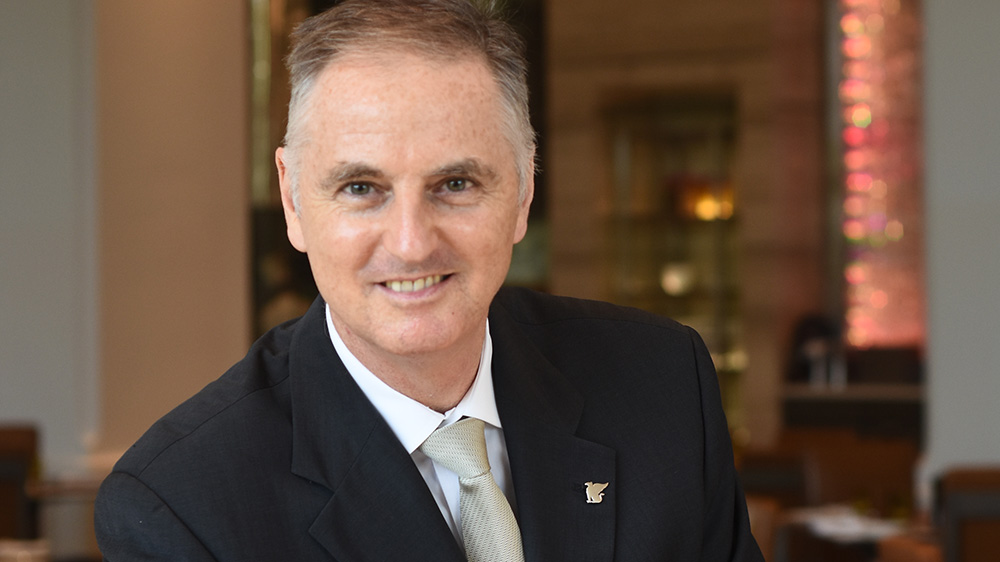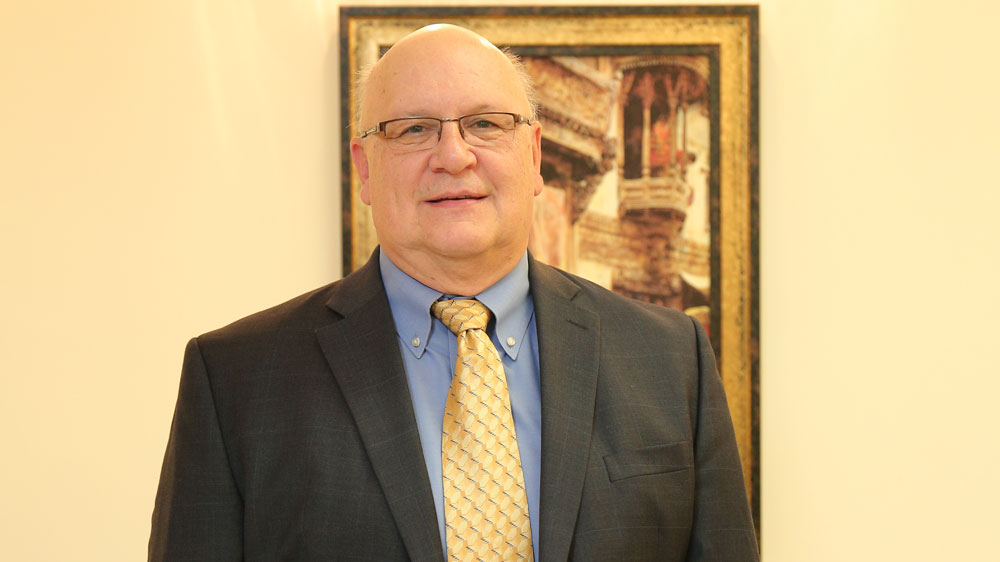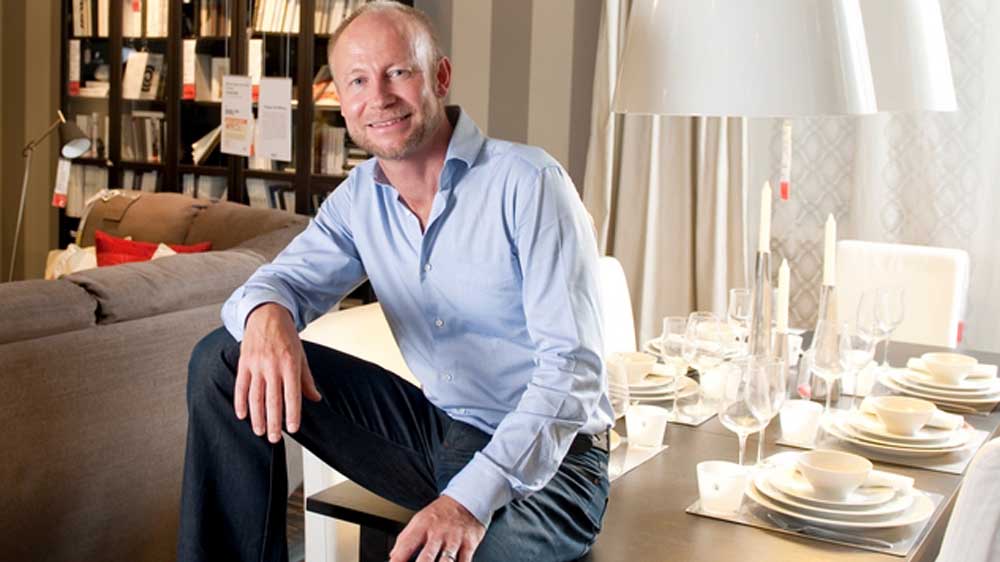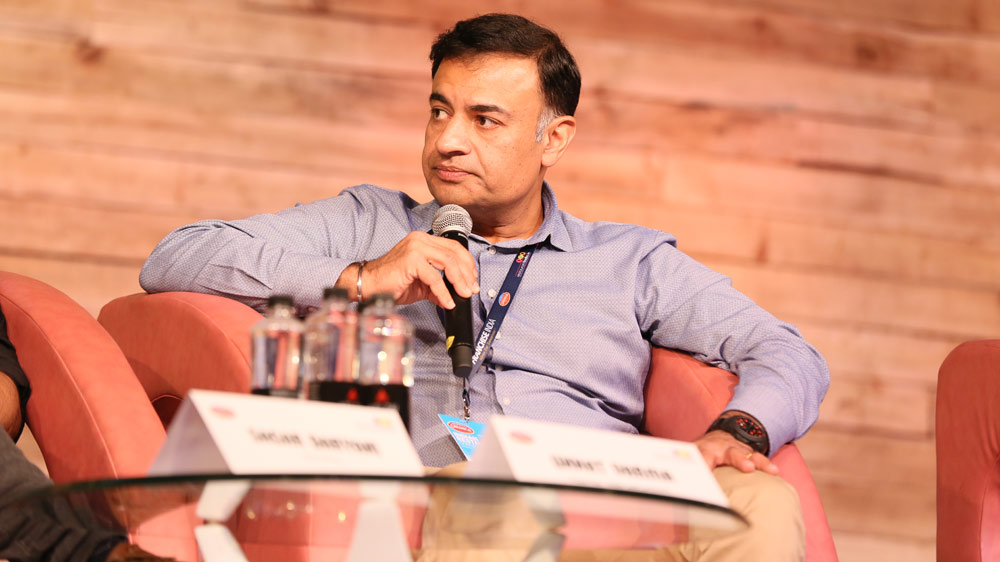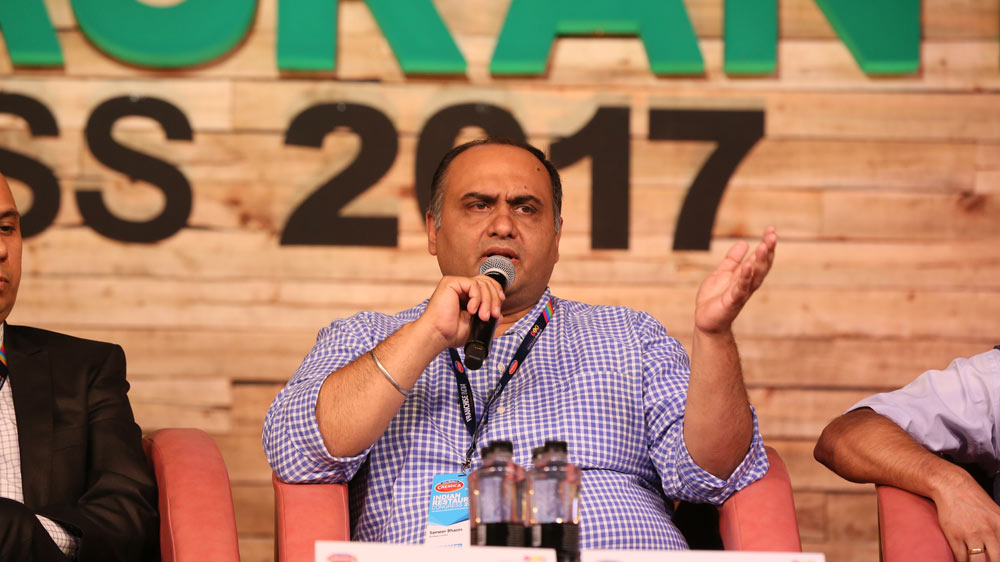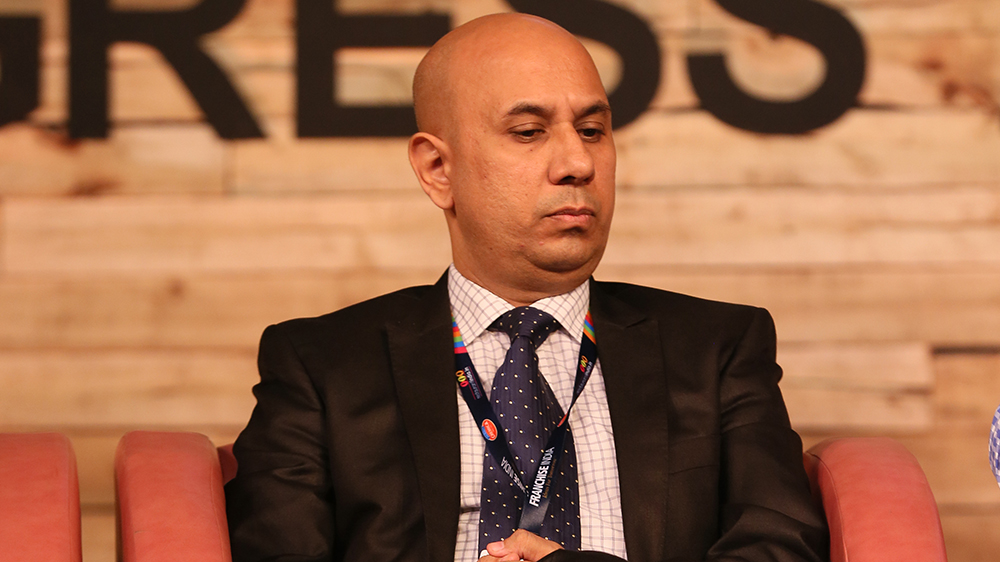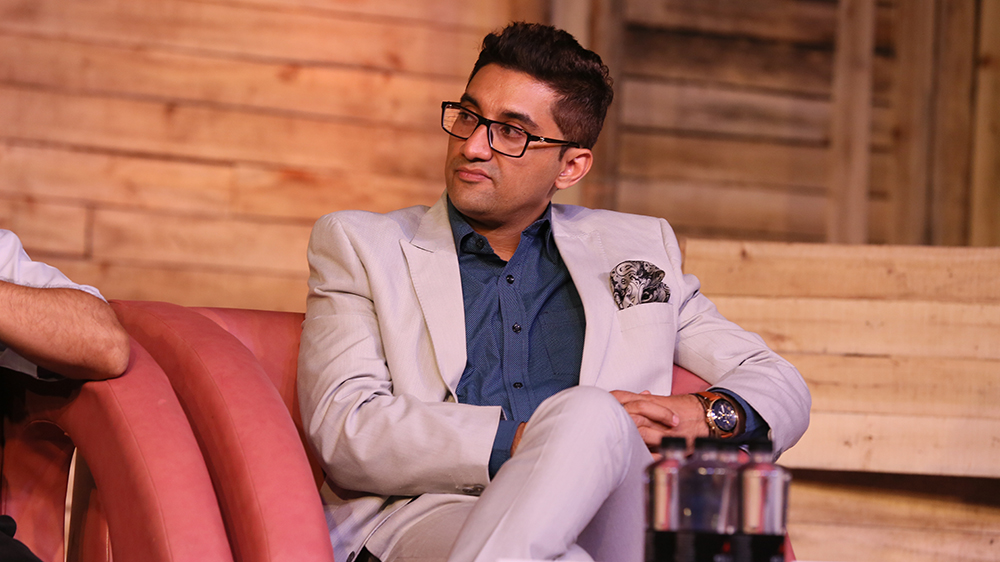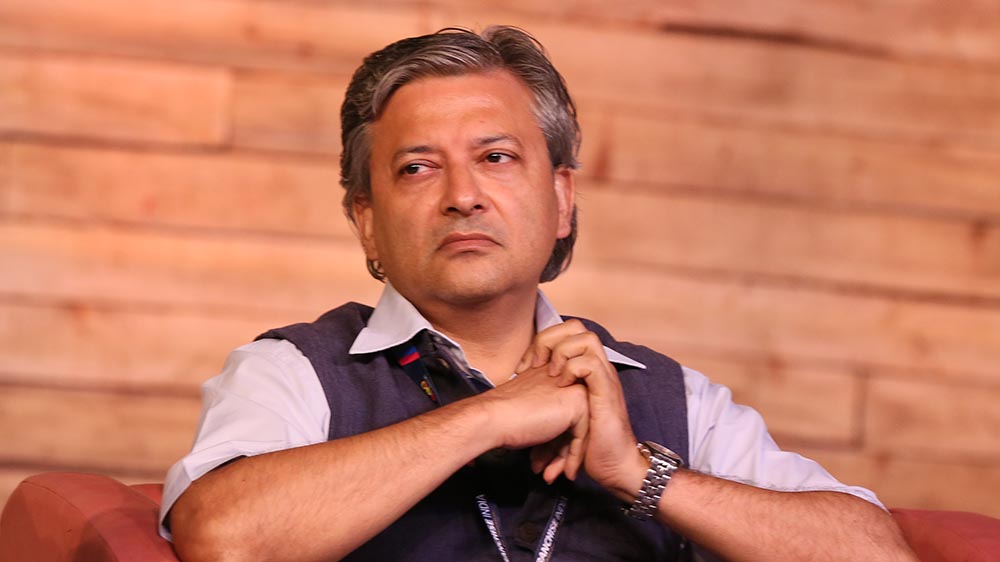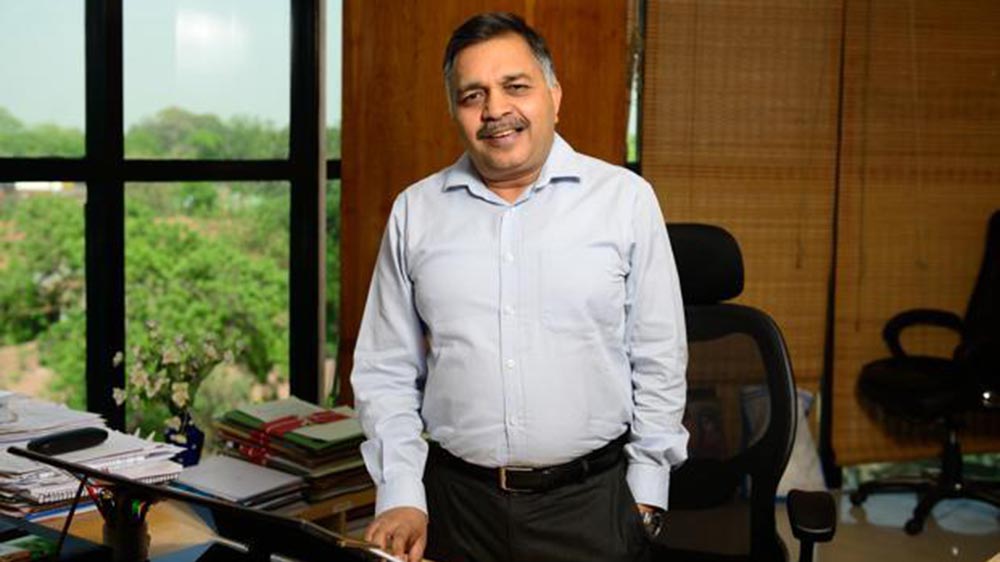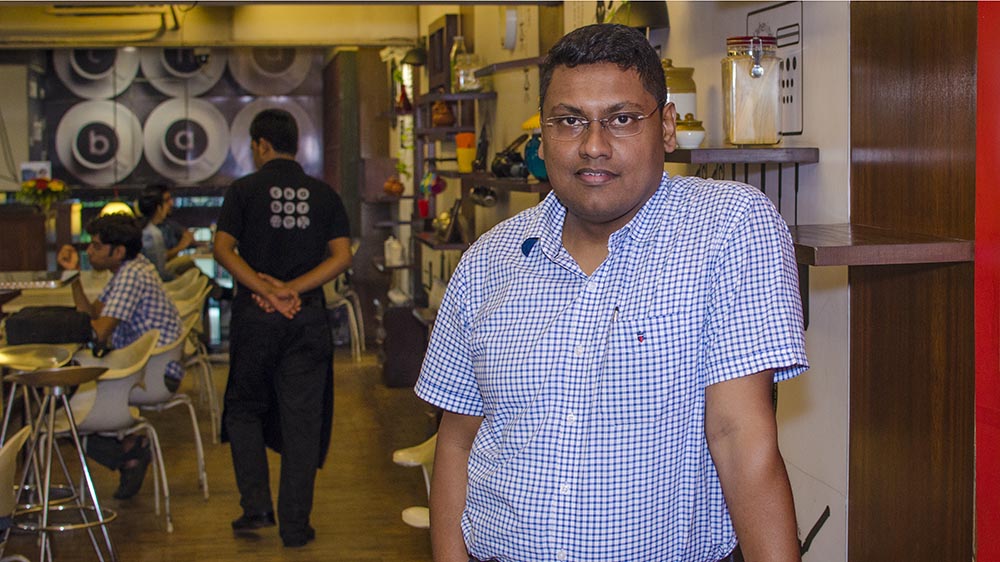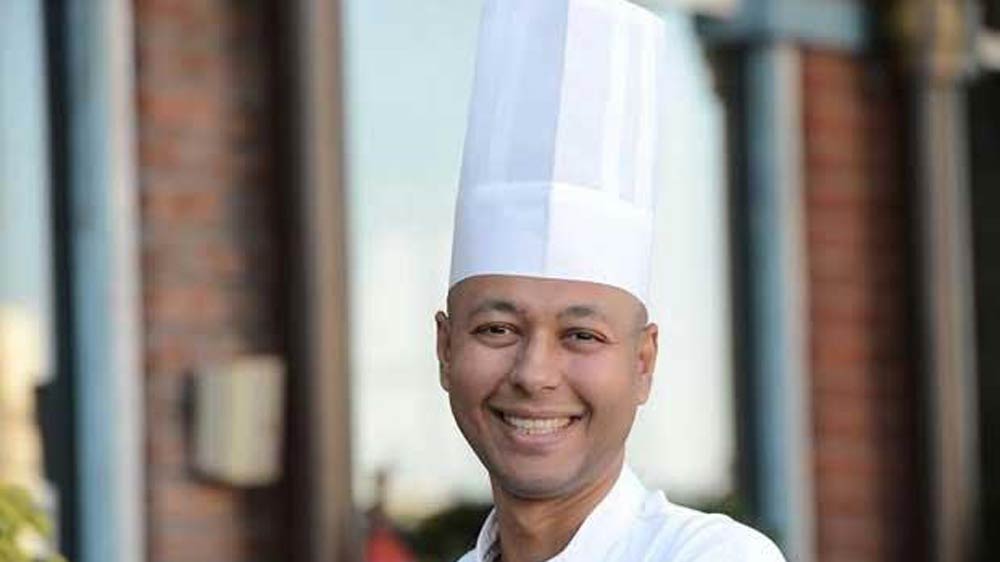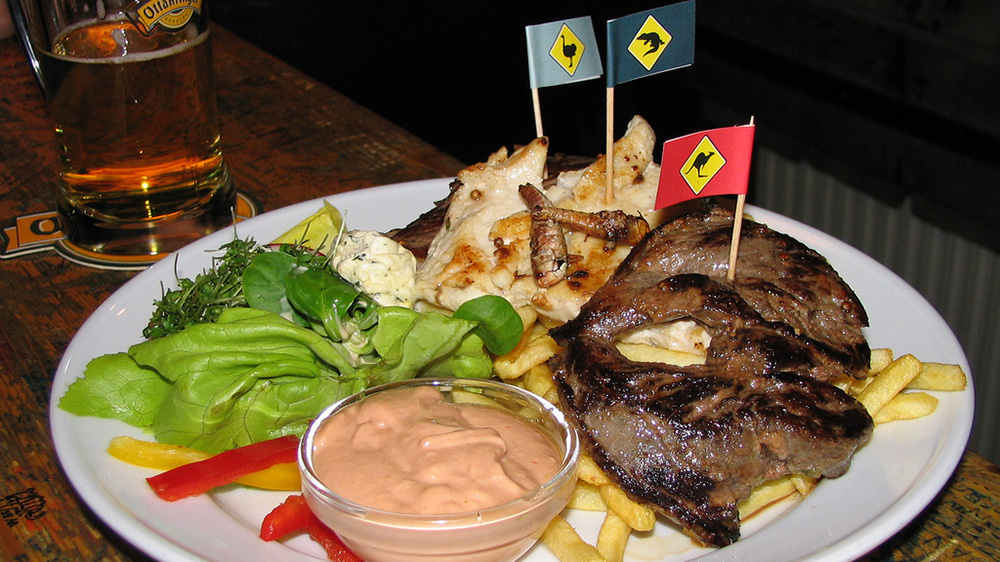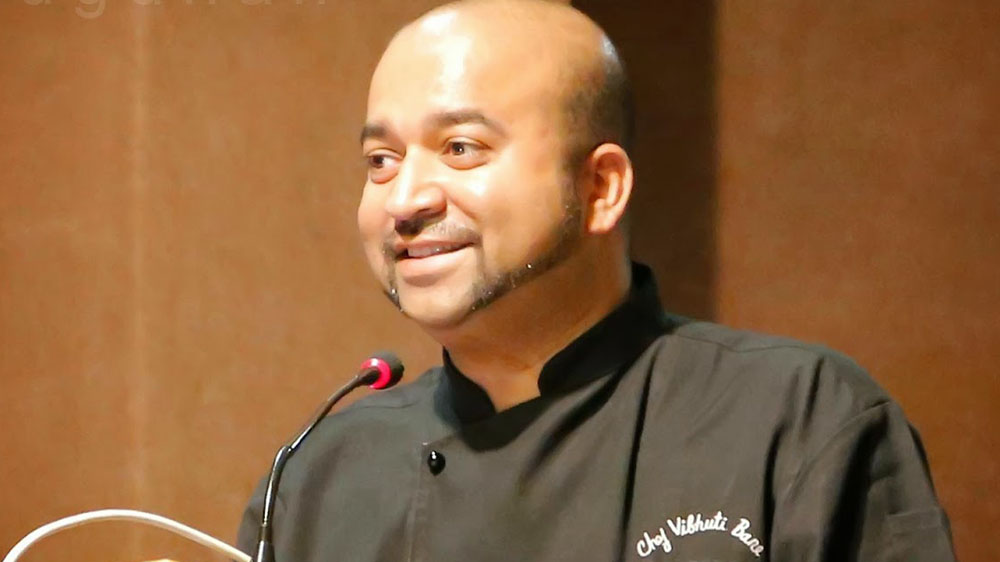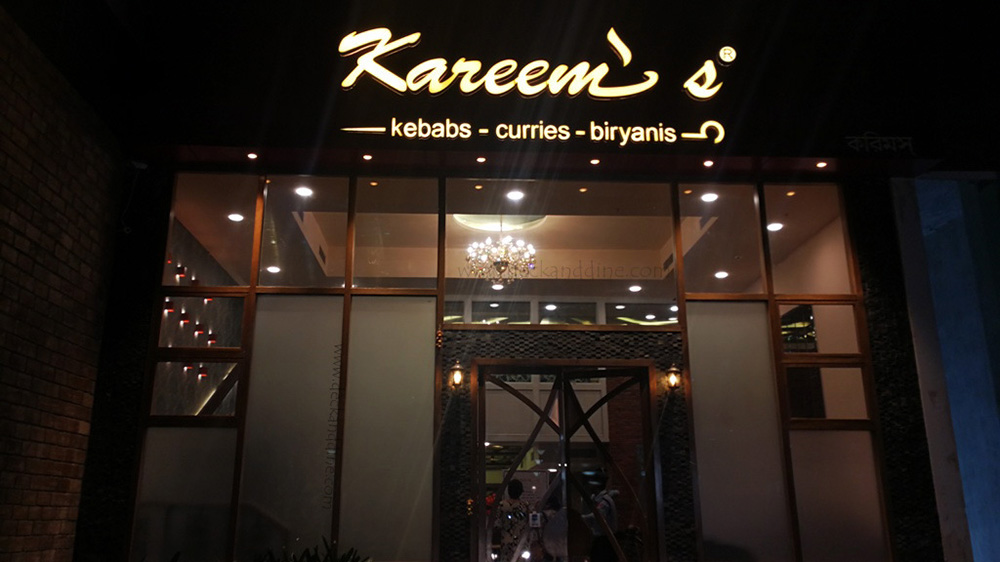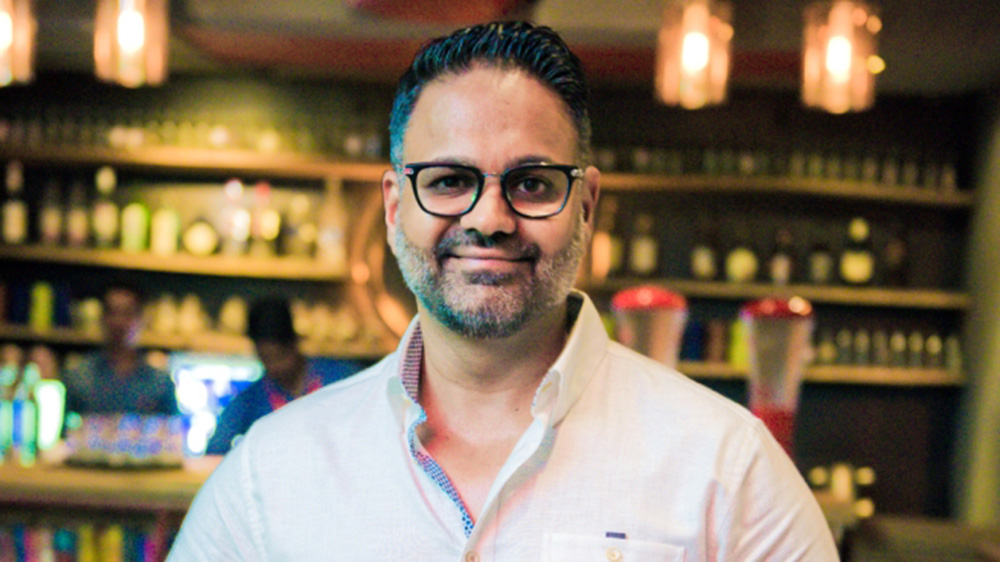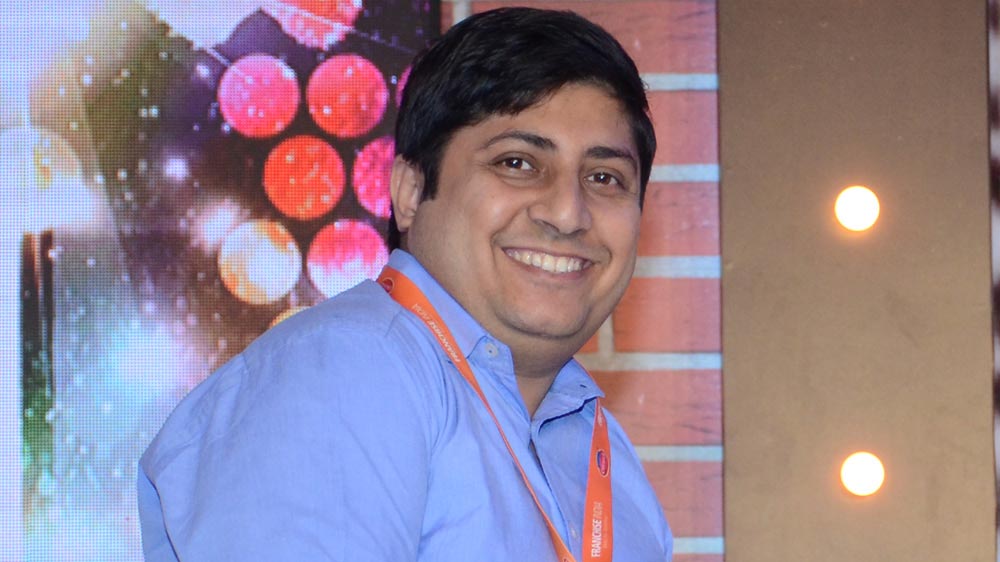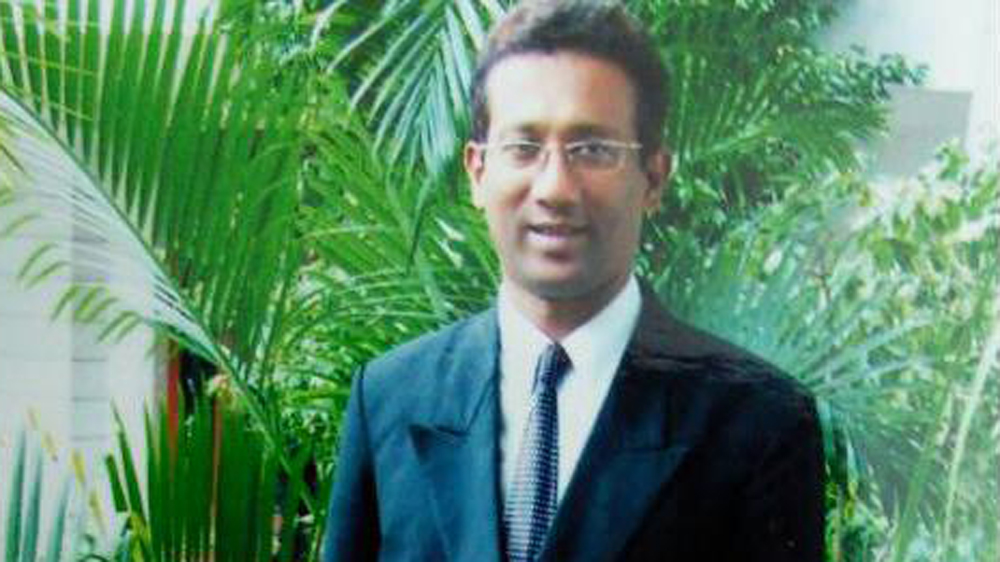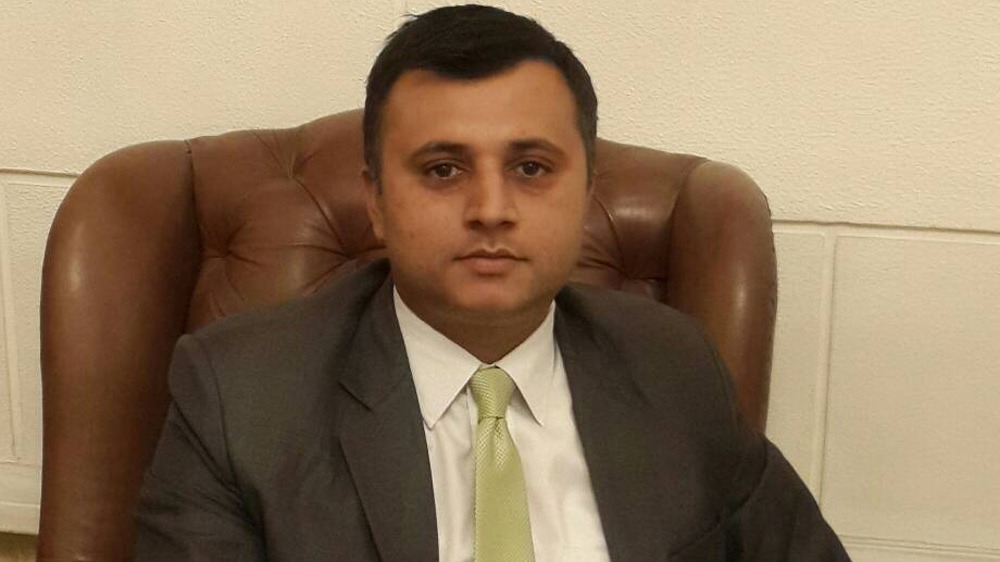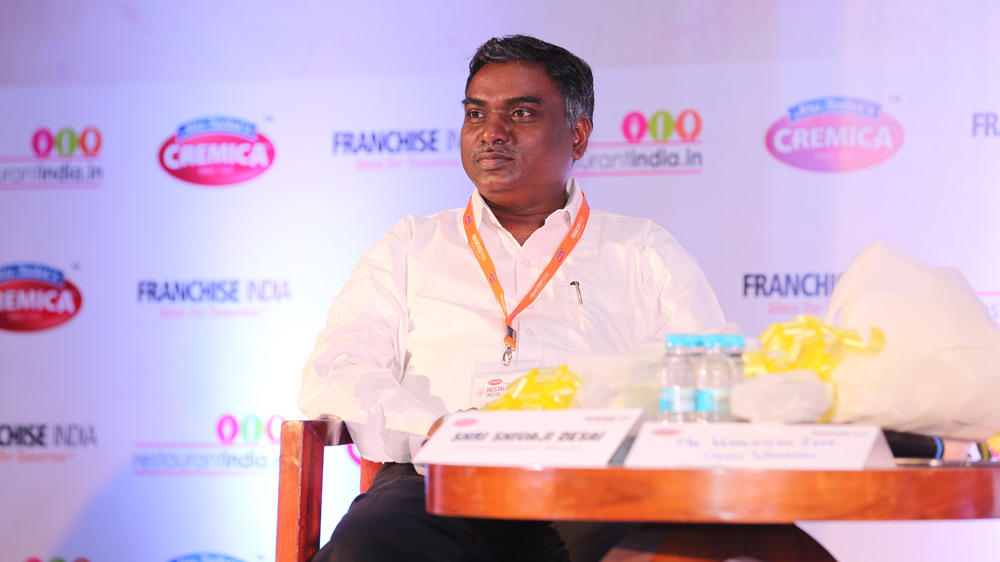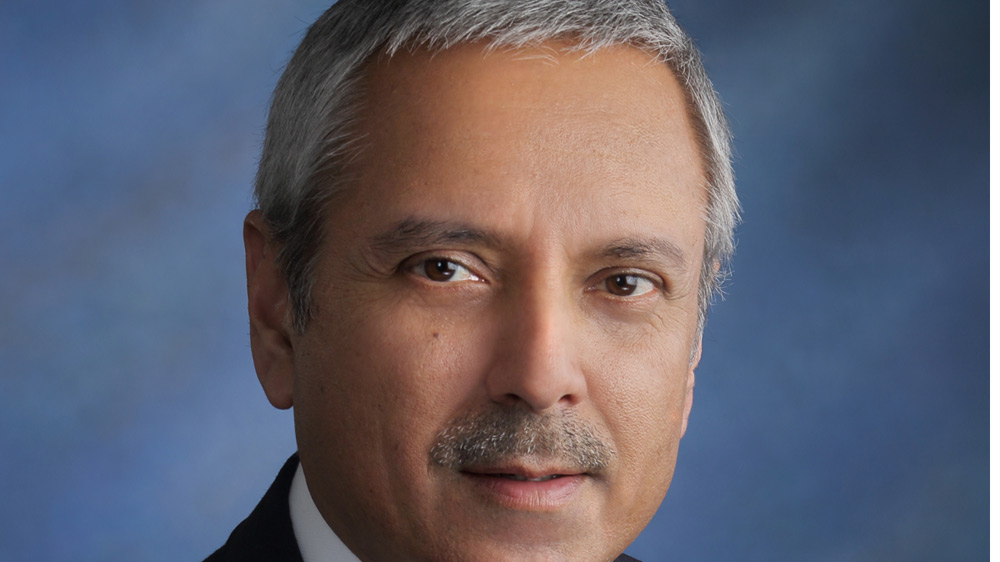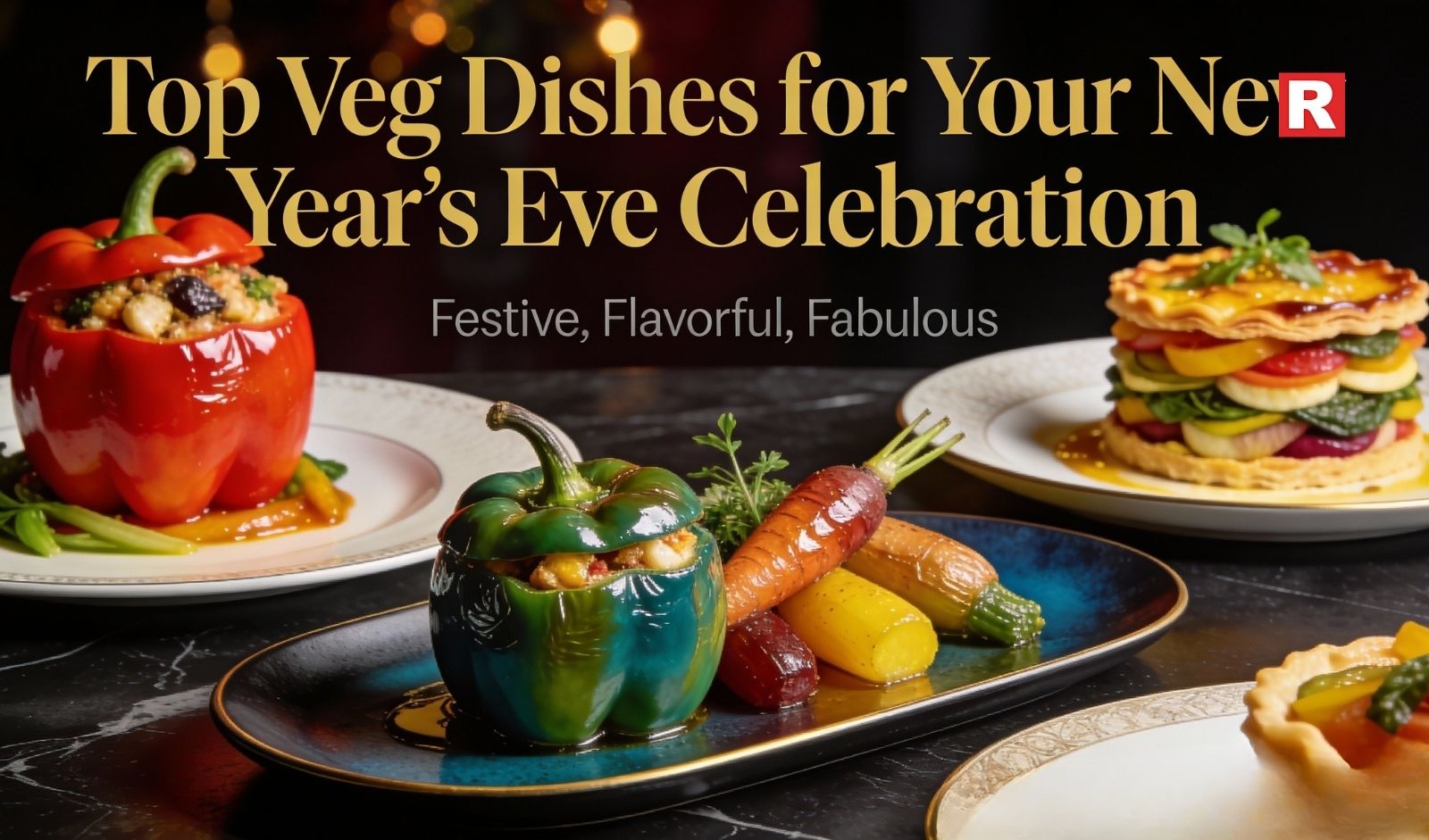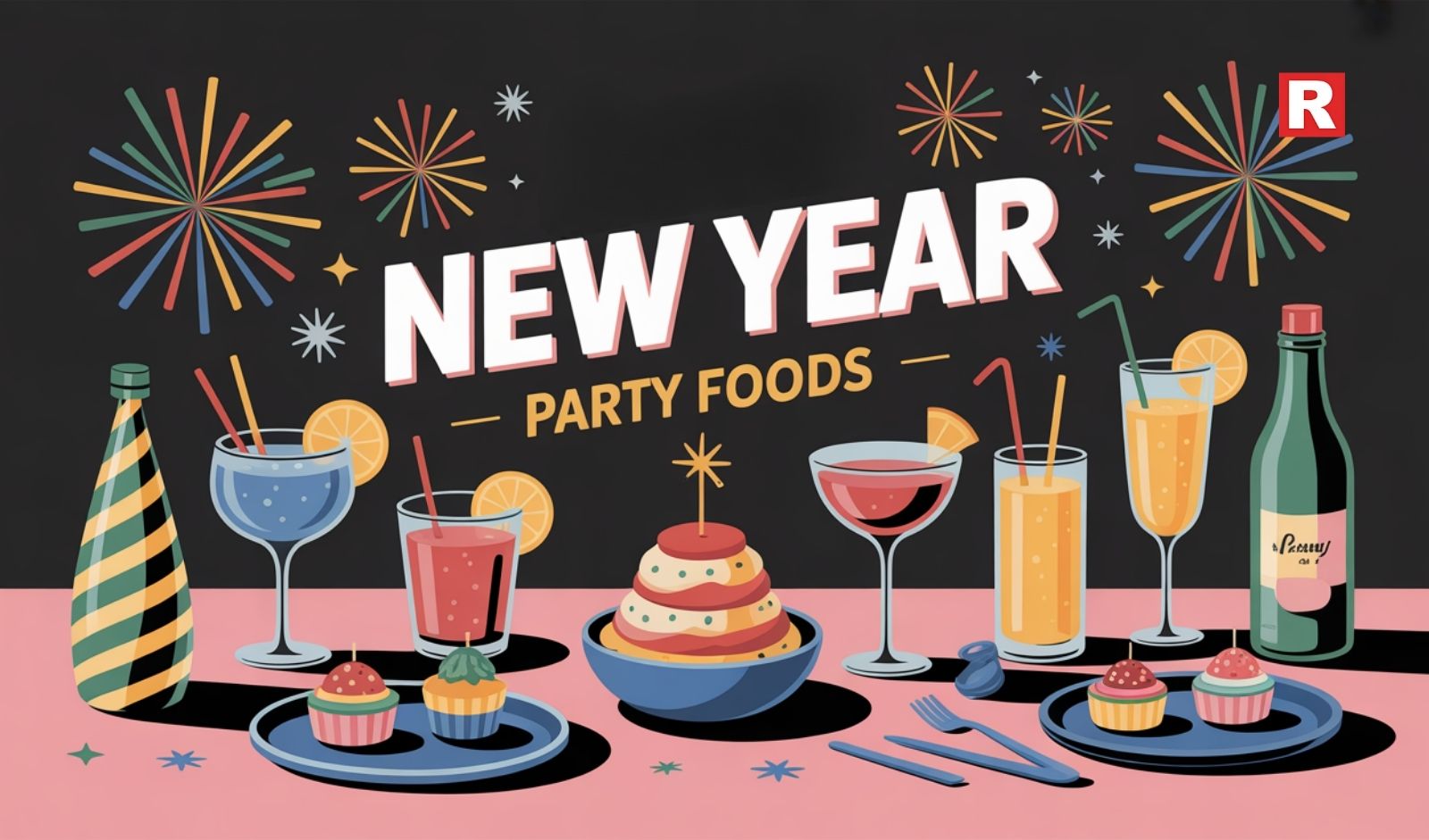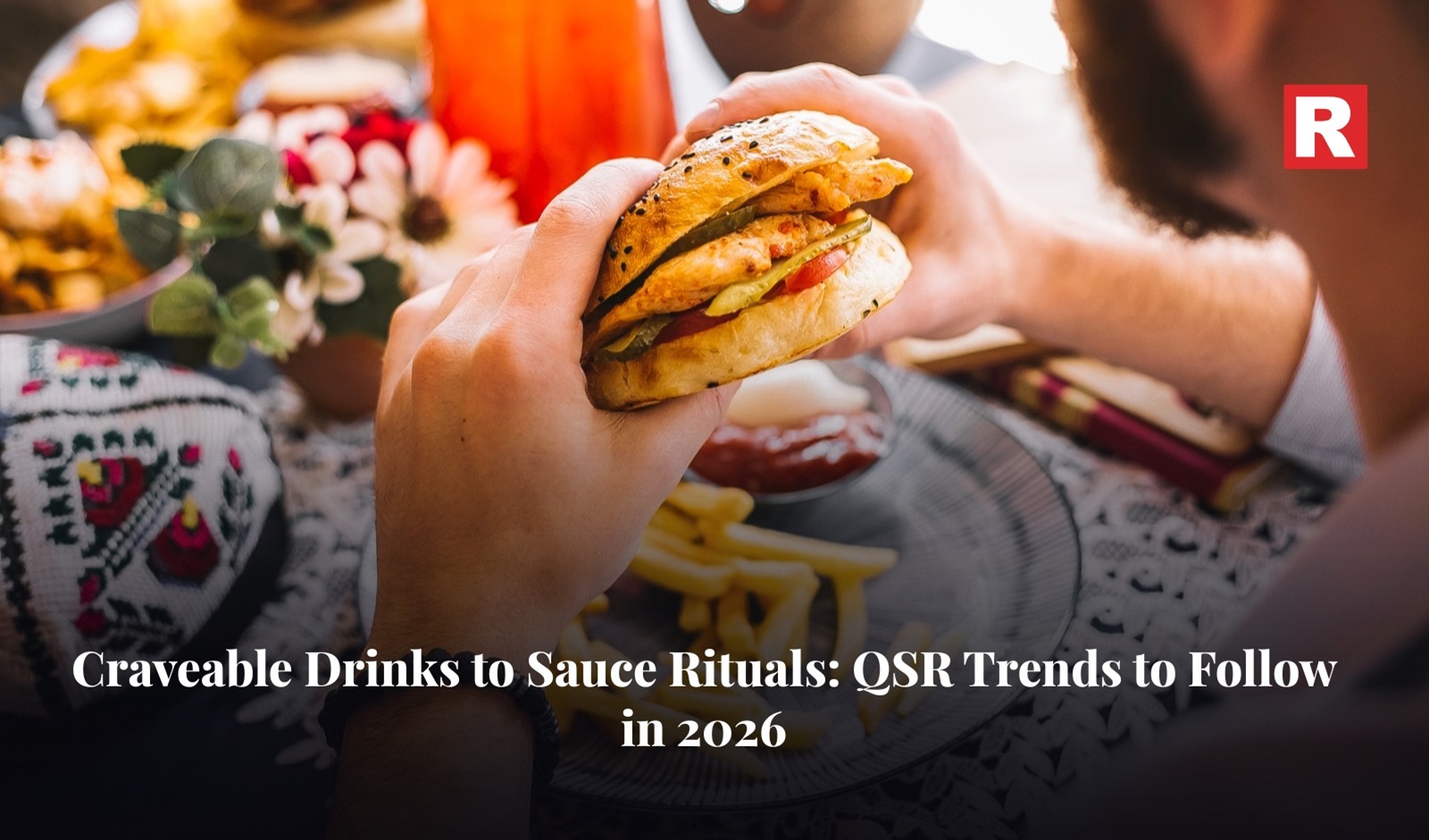
What made you choose hospitality as your career?
The constant customer interaction and the fact that every day is different; there is no monotony in our industry. Every day can be as rewarding and gratifying as one wants it to be. For a person who thrives on challenges and seeks opportunities there is no better place than the hospitality sector.
Under your leadership Starwood was rewarded as the best hotel in 2016.So, what are your plans to take JW Marriott to the next height?
The JW Marriott Mumbai Sahar is an incredibly beautiful hotel and well positioned in the market. Our owners have left no leaf unturned in making our hotel a compelling and excellent product. My objective is to build on the past successes and make it even better - in terms of commercial success, brand positioning as well as guest satisfaction. And naturally to make it a great place to work for our associates to grow their careers where they can find job satisfaction and reach their earning potential. The challenge with a good performing hotel is always how to make it better, identify the next trend, break with conventional wisdom and stereotypes and impress stakeholders.
You have almost 30 years of experience in the industry across Europe, Africa, and the Middle East & Asia. How do you see India at par with global standards and food trends?
Indian food has the ability to effortlessly compete with the finest cuisines and the latest F&B trends in the world. The quality of five star hotels in India (from a product/hardware standpoint), is as good as in any other part of the world. From a service delivery standpoint, India surpasses most European and American countries hands down. When it comes to food trends, in particular food from the North-West frontier area, Mughal cuisines, and naturally the famous curries and Biryanis from the south of the Indian subcontinent, India has the finesse and sophistication to compete at a global level. The versatility, complexity and creativity involved in cooking good Indian food is definitely at par with food from other parts of the world.
You are keenly involved in hotel operations, marketing, food & beverage, human resources and finance. Which aspect of the hotel businesses you find is more interesting?
Digital and social media marketing seems to be engulfing our industry 24/7. Consumers get bombarded with news 365 days a year. It became an art for marketing executives to distill that noise and determine what is important and relevant. In a globalized, totally interconnected economy, the job of a General Manager is to consistently monitor consumer behavior and provide a high level of personalized service; technology provides me with that opportunity. The dynamism of electronic media and rapid changes in technology fascinate me. We moved light years over the past two decades as far as communication networks, distribution platforms and technology is concerned – all in benefit for the customers.
Food Beverage is naturally an equally exciting subject. As consumers becomes more affluent and knowledgeable they begin to gain a better understanding of food cultures as well, they become more daring and advantageous in trying different things. This evolutionary process benefits all parties, chefs, who can dare to be different and experiment and consumer who have wider choice of food available.
India is at peak of growing food culture. What are some of the trends you would like to introduce at Marriott?
I don’t think India is at its peak as far as food culture is concerned; what we see is just the beginning of an evolutionary process that will take many more years to realize its full potential. We haven't even scratched the surface yet. I am always amazed of the talent and passion I have encountered in India from chefs, they can easily compete with the best in the world - the level of innovation and “out of the box” thinking is phenomenal.
Talk to us about your journey in the world of food and hospitality?
Food always played a vital part in my life. I was always fascinated by different species, herbs and the complexities of making sauces and bring it all together in a harmonious tasteful dish. Curries are a classical example of that complexity that blends spices into an artistic dish. As I started my journey in the hospitality industry as a Chef, I started believing that Chefs should be held in the same esteem as any other artist (and not necessary for the showmanship but simply for their creativity and boldness). Food defines our culture, who we are and where we belong. In the last three decades I learnt that the success of a hotel depends largely on the quality of its food and beverage it provides to its customers. Soon I saw myself cross training with different departments and saw myself gaining a strong understanding of all of the hotel’s operations. Before I knew it, I saw myself wishing to learn more about the business aspect of a hotel, its revenue strategies, cost control mechanisms and how to successfully market your brand in an increasingly competitive environment. There was no looking back from then. My first encounter with India was in 2001. I was amazed at the diversity in cultures, cuisines, values and traditions. India, the land of wonder, has not stopped amazing me even today!
How do see the competition in the market?
Competition will only intensify; it would be wishful thinking that competition will disappear. Competition is healthy as it forces hotel companies to innovate consistently to remain relevant – and as a brand this is what you want. Likewise, competition is good for the end consumer as it provides more choices which in return forces hotel operators to be on their toes.
Can we expect you of opening a restaurant of your own as you have got so much experience?
Well, stay tuned, I won’t let the cat out of the bag! J

Amanpreet Singh Matharu is recently appointed Director of Food & Beverages. He brings with him over a decade of expertise and operational skills in the hospitality industry with great understanding of dining trends and innovative concepts. He intends to raising the bar and elevating dining experiences in his new stint and give an impetus to the dynamic food & beverage operations of The Westin Gurgaon, New Delhi which offers seven different dining venues to satisfy even the most discriminating of palates. The hotel’s on-site outlets offer everything from a casual breakfast buffet to multicusine and traditional Italian favorites at the all-day diner Seasonal tastes, to the flavors of Asia, at EEST- the Pan – Asian specialty restaurant to authentic Italian at Prego, cocktails and appetizers in Mix Bar and Lounge, poolside bites and drinks at Splash, Daily Treats for brewed coffees and freshly baked goodies to STORY Club and Lounge which is the most happening nightlife destination in Gurgaon.
Restaurants are infusing global flavors to India diners. How have you seen Indian diners eating habit changing in all these years?
Today, palates have changed, As the average Indian travels more, watches more TV, is exposed to more information and eats out more often, there is a definite shift towards innovation and authentication. Diners these days are looking for adventure on the menu, but the fact remains that they are also looking for authenticity on the menu, and will be willing to pay extra for dishes steeped in tradition. Heritage cuisines are the new buzzwords and gourmetfication of home-style food is being re-explored even while eating out.
What are some of the ingredients that has gained prominence in the restaurant kitchen in the last two years or so?
Locally sourced farm grown organic ingredients have slowly found a permanent place in kitchens. This makes a big difference to the flavour profile of a dish, as ingredients taste better and more natural when they are grown without preservatives.
What is your favorite ingredient when cooking/ designing a menu?
Regardless of the cuisine, the most irreplaceable factor of any menu remains the chef. It’s his/ her creativity, curation, preferences, personality, sentiments and skill that any menu should be able to pay homage to and represent effusively. Apart from this, I feel ingredients that are fresh and locally available are favored.
We see that people are looking after healthy food options and meals. How are you attracting guests at Westin?
In today’s age, eating healthy often becomes a challenge with frequent business meetings and socializing over the weekends. We are adding more health-forward menu items that feature visually exciting flavors and ingredients to boost their appeal among diners. Infact, Westin as a brand is committed to our guests’ well-being understands the importance of eating healthy food and focuses on signature wellness programs that empower you to eat, sleep, move, feel, work and play well, so you can be at your best while on the go.
Tell us something about millennials food patterns?
Over the past few years, India has witnessed an explosion of fine dining restaurants, cafes, pubs, bars, clubs, lounges, and international fast food joints, which have to come up to cater to the millennials’ changing food habits. The millennials’ changing food patterns are tending towards conscious indulgence. They want to indulge in the practice of eating out and eating good, yet they want to be mindful of what they eat and will select their places after thorough consideration.
Young people prefer places with strong food ethics. They want to know how fresh or organic their food is, where their food is coming from, and if it is ethically sourced- the entire farm-to table concept has gained massive proportions.
What trend you see would rule Indian f&b space?
In today’s age, we are all are trying to get back to our roots. Local will be exotic as the prominence of regional and sub-regional cuisines is gradually increasing. Heirloom recipes and nostalgia will increasingly find place in professional kitchens. Cuisines of Bhojpur, Pondicherry, Mudalia, Mysore, Madurai, Uttarakhand etc. — regions that were not spoken of earlier— are gaining prominence.The future of flavor also lies in creating healthy dishes without giving up satisfying taste. Another trend that is catching up is offering flexibility of portion sizes; to encourage ordering of a new dish is to offer it in a shareable or appetizer-sized plate—this smaller portion encourages the customer to try something new at a lower price point. The heavy influence of social media trends on food cultureis also something which we will not be able to discount. And of course – the importance of the wow factor in the entire experience and presentation and not just taste. Though taste is a non-negotiable, the presentation and ambience are also very important as people are keen to explore the complete unique experience these days rather than just a meal.
What role does food play when pairing with the favorite liquor?
Food plays a key role in the flavor of a drink, it can enhance or inhibit. Your beverage can pair nicely by contrasting with the flavor of your meal or by being a flavor twin and mirroring the flavor of your meal. Important physiognomies to consider are the impact, body and alcohol content of your beverage.
What will be your role as a F&B Director at Westin?
In my role as Director of Food & Beverage for The Westin Gurgaon, New Delhi, I will be overseeing and providing strategic leadership to the operations of the hotel’s varied and vibrant food and beverage outlets as well as its niche and bespoke banquet events, with a focus on giving a fillip to delivering excellent guest experiences.

UNO Pizzeria & Grill would constantly get inquires for India but they could not find the right partner who had a vision that matched the Chicago- Deep dish pizza brand until they met both the Dhunseri and Ambuja Neotia Groups. “Being successfully internationally means you need to have the right partnership and we found that with these two groups,” shared Frederick Houston, VP- Franchise Operations for UNO during his India visit. Read, what he has to say on his India operations:
The Journey of ‘Pie’
We were contacted by Dhunseri in the spring of 2016 about bringing our brand to India. Mrigank Dhanuka had our pizza while studying in the US and loved it. I meet them in Chicago to review the opportunities and shortly after that I met his father Mr. Dhanuka and we sampled our entire menu. He was very full but enjoyed the pizza and the cookie Sundae. We were able to finalize out deal in late 2017. After we had reached an agreement for the Master Franchise rights for India with Dhunseri they brought in Ambuja Neotia as a partner.
Franchise as a Best Model
In order to be successful in a market place you need to understand the market. We can’t do that from the US so we rely on our partner in country to know the markets and the guests. With this in mind we prefer a franchise arrangement. Also, by franchising we are able to grow our brand presence both domestically and internationally. We are able to get our pizza out to many more guests. We are able to leverage local knowledge and expertise to grow more prudently and effectively. Finally, we can grow quicker.
ALSO WATCH: ‘What made Carl’s Jr to enter India’ by Ned Lyerly
Learning from Global Experience
With my many years with the brand I have seen successes as well as obstacles that needed to be overcome so I believe I bring a very balanced and honest approach in helping our franchisees understand our heritage and brand. It is all about working together to provide our guests with an extraordinary dining experience so that that brand can grow.
UNO in India
We have opened restaurants in Kolkata, Noida and Bengaluru and we are looking to add more sites in these regions before moving on to new cities.
MUST READ: We Will Recreate The Restaurant Experience With Uno India, Says Harshavardhan Neotia
The Right Customer
All our markets are different and our franchise partners do a wonderful job bring our brand to life but I feel the market with the greatest potential is India. We appeal to a wide range of people but our core is anyone in the age bracket of 20 to 45 year old as well as families.
Localising the Menu to Suit Indian Palate
We are working with the team in India on the menu and we have tweaked the flavors on the menu in order to give our guest in India the flavors they are looking for when they eat out. We have also added many more vegetarian dishes to balance out our menu.
Trends happening in India
One of the biggest trends is that guests want authentic foods with bold flavors. As a result our team headed by our executive Chef Andre Fuehr along with Indian corporate chef is creating dishes that provide our guests with items that are unique, fresh and of flavors that suit Indian palate. We do two menu rollouts each year in order to keep our menu fresh and in addition to these we do four limited time menu rollouts each year.
Expanding the Business
We want to be prudent and measured in our expansion plans. India is a very dynamic market with a great deal of opportunity but in order to maximize the opportunity in front of us we need to be thoughtful in our approach to finding the right sites for our brand. Our goal is to open over 40 restaurants over the next 5-7 years and I believe with the team in India we can achieve this

In an interview with Restaurant India at the FICCI Annual Summit ‘MASSMERIZE’, Patrik Antoni, Deputy Country Manager, IKEA India shares the inevitable journey of IKEA in India and how has been the response so far.
Tell us about the brand IKEA.
Ikea, the Swedish furniture retailer which has been sourcing from India for more than 30 years, has opened its first store in Hyderabad in July. The Ikea store houses a 1,000-seater restaurant—one of Ikea’s largest globally, as the company believes food will be the first contact point between Indians and Ikea.
IKEA is globally well spread out to 50 countries. We have around 420 stores catering to almost 1 billion visitors. We have now come to India which dates back to our long history in this country. IKEA has been present in India for the last 30 years, sourcing for its stores around the world. In India, IKEA currently has 48 suppliers with about 45,000 direct employees and about 400,000 people in the extended supply chain.
What was the idea behind the 1000 seater Restaurant that is gaining popularity since its inception?
We are betting it big on tempting the average Indian's taste buds by launching the biggest-ever restaurant inside an IKEA store and "possibly India's largest. The massive 1,000-seater restaurant serves customers a wide range of food items consisting of staples from Swedish and Indian cuisine, from meatballs and salmon to biryani, samosas and dal makhni. Fifty percent of the food will be Swedish inspired, salmon and shrimp dishes and so on. We'll also have quite a few Indian dishes like dal makhani, biryani, samosas.
We are trying to understand the needs, dreams and aspirations of the Indian customers. And during all our visits, we have understood that for Indians, food is everything that matters and is utterly important.
After the massive launch in Hyderabad, how has been the customer response so far?
From the food perspective, there is a queue almost every day to get in. The food offerings are Swedish & Indians so we call ourselves Swedish feel with an Indian appeal. The response so far has been satisfying and people are really happy with the kind of food they are served here at IKEA.
Is IKEA planning to expand in the food segment?
Food is the first contact point for Ikea in India. The 1,000-seater restaurant in the Hyderabad store is one of largest for Ikea globally, which has a lot of vegetarian options. We have the meat balls, including the vegetarian options and fish dishes, but we’ll not sell beef and pork in India. About 50% of food is Indian cuisine and the rest are Swedish dishes.
We might see developments when the food segment is concerned. We may look into possibly extending our food experience to outside of the store. We believe it has a great scope for our brand value and great value for money. At the end of it, at some places you can touch more people with food and each out to the massive audience.
As we see big opportunities in India, we believe that we will increase our investments as we continue our expansion in the food segment.
Are you looking forward to smaller models in the future?
We have been in the retail format for the last 20 years. As the retail market is changing, people are demanding more access to brands whenever, wherever and however they want. We are looking forward to centrally located stores, with 15,000 sq ft and all we want is to get closer to people and make them indulge in the traditional IKEA experience. We are opening soon in Mumbai.
How many stores do you plan to open in the next 2 years?
In 2019, our focus will be Mumbai, followed by Bangalore & Delhi. We are keeping our targets fixed in these three cities including Hyderabad.
Why did you choose India as a destination for IKEA expansion?
We have always looked for markets where we can make a difference to not the rich because they already have an access but for those who can actually make the IKEA experience count. India as a market has a strong economic potential where people are looking for comfort in their everyday life. Also, ‘home’ is a big factor for the Indians when there are festivals and celebrations, which indeed make them slightly different from other countries.
We would like about 30-40% of the people living in the city visiting our store in the first year.
Your opinion on the F&B space in India and what are you looking forward to?
It’s not about taking a piece of the pie but making a big cake out of it. We are here in India to stimulate the interest the life at home and it will be beneficial to the industry and make it happen for food.

The foodtech market in India is projected to grow at a CAGR of over 12% during 2016 -2021. With increasing private equity and venture capital funding, the foodtech companies are focusing towards expanding their business in Tier II & III cities across India. With growing competition, online food ordering companies are focusing on providing faster delivery in major metro cities to increase their customer base.
Spearheading the technology and digital thrust of the Restaurant sphere at the Indian Restaurant Congress, Anand Thakur, Chief Digital Officer, Jubilant FoodWorks Ltd shares the technological dominance that has changed the delivery and dining experience altogether.
The Win Win Situation
With technology overpowering the Restaurant Business, there have been partnerships created that benefiting both the diners and the partners. When asked about the same, Anand said,” Technology is big and it has been coming off age for the past years.”
As far as food tech is concerned, Anand continued,” This is the era where things will change with concepts like social media, digital marketing and democratising delivery in the Restaurant space with technology touching all the multiple aspects of the Restaurant Business like customer acquisition, delivery and dining.”
“It is important to have a strategy in place to ensure that you are on that bandwagon and do not miss out on this wave of technology”, added Anand.
Think Big: Delivery or Dining?
The dining experience changed with technology capturing the restaurant space. Few months ago, technology for restaurants was perceived to be something where you order and the food gets delivered at your doorstep.
Anand opines,” Without any doubt, dining makes the restaurant business more feasible. It is important that the Restaurant Business in general, cracks the right balance between dining and takeaway.”
Still Lagging Behind
It is no more an unknown fact that the concept of 30 min delivery as promised by Dominos is not that fulfilling anymore. When asked about the same, Anand said,” Apart from the product itself, delivery is our forte. There has been a huge and tremendous growth in the recent past and with technology growing faster, there have been certain issues where Dominos as a brand has not been able to fulfill the 30 minutre delivery promise. Given all the delivery businesses in the country, we are still the fastest and the best. Our intent for the future is to make sure that the phrase of 30 min quick delivery is fulfilled.”
Multiple aspects of food business which starts from customer acquisition, to the experience within the restaurant that includes not just the lighting or ambience but also food and with technology in hand, it is facilitating the whole experience.
Food For Thought
Indian Restaurant Congress 2018 brings together the biggest minds of the industry, sharing plethora of knowledge and ideas with each other.
“I am here to share my understanding of food and tech put together. Gaining knowledge from top players in the business of how they see technology and delivery with measures taken to fulfill the much awaited gap in the market”, said Anand, CDO, JubilantFoodworks Ltd.

Food was always a love for Dildeep Kalra but venturing into the business happened after getting married to Zorawar Kalra who has become one of the top names in the restaurant business these days. Today, Dildeep handle and manage brands under Massive & StyleHorn, which is her own entrepreneurial venture.
Massive Restaurants recenetly raised approximately Rs 160 crore expanding to 14 countries. What is your view on this?
Yes, it is true that we raised a funding of 160 crores to exhilarate our expansion plan. It feels great and we will be able to successfully launch our brand outlets at well-researched international market.
How are you planning to fuel international expansions?
We have strictly aligned ourselves to it, starting from exhaustive research and experimentation to the execution. The launch is scheduled to happen mid this year. It is fueled by some of the most interesting culinary concepts basis innovation and current food trends of the location.
Your brand is currently working on two different concepts- seafood and traditional Indian sweets. How are you planning to innovatively redefine the cuisines?
Innovation is of utmost importance at Massive. All our menus are curated post a lot of experimentation with different ingredients to come up with the most unique and innovative dish, be it an Indian sweet or Seafood.
How do you see your brand today after 6 years of its establishment?
We started small by working like a family with creativity and innovation as base; we still continue doing it that ways. The only difference is that we have scaled massively. Six years from now I envision Massive Restaurants to have touched all the key locations in India and most of the well-researched locations internationally that are suitable for our brands, mapping our modern Indian cuisine.
What has been your biggest challenge while achieving the success you have today?
Our processes are well structured and we take each step after a thoughtful decision that includes all aspects of consideration. Hence, we leave no room for challenges internally yet definitely the sudden change of GST was a bit of a beating but it all went smoothly with best execution.
What do you have to say about the learning and experiences you got from ‘the Prince of Indian cuisine’, Zorawar Kalra and Jiggs Kalra?
I had a phenomenal learning experience from both. Our mentor and the Czar of Indian cuisine is a walking-talking food encyclopedia. The entire Massive team including me has learnt a lot about food and cuisine. Zorawar being the ‘Man with a Vision on a Mission’, I take away learning zero procrastination from him. He has sheer passion for food and truly believes in what he believes, so conviction is another key thing that I learnt from him.
What has been your biggest achievement till date?
It’s yet to come. However, the success of all the existing brands is an achievement for me and the entire team of Massive & StyleHorn.
Massive Restaurants was ideally established to help in the evolution of Indian cuisine and putting Indian food on the global palate permanently. How do you see the impact your brand has created till now in achieving this goal?
It is the way diners see Indian cuisine now: The global outreach and wider acceptance for Indian food by the millennials and young generation.
What are your expansion plans?
The future expansion plans are very aggressive as we intent to be a major global food & beverages company in hospitality industry in next 5 financial years. We plan to launch our brands at almost all the key locations in India covering the length and breadth of the country as a lot of our formats are suitable for the locations. We are also geared up to launch one of our critically acclaimed brand, Farzi Café in some of the key locations abroad.

What will be Jack Daniel’s strategy for Indian market further?
If Jack Daniel’s took off in India it would be really tough for us. The market and people have started to evolve. Our target is to give our best in the market. Jack Daniel’s doesn’t rely on what market is for success but we ride the world economies. Our driving principle is to ensure that we maintain quality and consistency with not just our products, but also the way our brands are positioned and the way we talk our brand to the consumers. The ambition is to be number one whisky brand in India.
We feel it is the right time for the Indian market for which we have right mix products, resources in the country, developing interests for the brands coming in from out of the country and we want to be the part of that. Around 40 percent of our revenue comes from the US and the rest 60 percent comes from 160 countries around the world.
Are you customizing the products for diverse Indian market?
For different markets, we do make more affordable and accessible products. We are continuously trying to understand this market and evolve our strategies. We will put five products in the market that we think are relevant. For affordability, we have launched smaller SKUs to make our products more accessible to the consumers. Globally we have 10 products in our portfolio and over the next three years, there may be 12-13 products. In general, whiskies have evolved towards better.
How Jack Daniel’s can be more relevant for vodka preferring young generation in India?
Whisky is back in the trend again for most of the globe. It’s not more of year- on- year change it’s a generation of choice. The overriding trend is that people are going for more flavours for spirits. There are different brands that are doing extremely well but in general, they are not keeping pace with whisky. India definitely seems to be whisky friendly. We are a serious whisky maker but at the end of the day, we want to create products that people like drinking.
Do you think Honey and Fire will move towards more serious whiskies?
Hopefully honey and fire is the whisky which has certain elements which lead whisky drinkers to taste other styles as well. I think they will because we found a lot of young people aspiring for Honey and Fire at the first step. Honey has sweet flavours of its own so it doesn’t necessarily pour with another sweet cocktail. With honey, you don’t necessarily need coke.
How do you find awareness about the brand among Indian consumers?
Indian consumers travel around the world today and also with the advent of digital media and social media the exposure is far higher amongst young legal drinking age consumers. People want to learn more about the good brands in the market. A lot of mixologists are coming out of this country and doing well even at global platforms. There are many whisky cocktail bars opening in the market because there is a demand.
Do you believe education about Jack Daniel’s in the F&B community is very important?
Partly, because there are a lot of brands out there. If the consumer recommends Jack Daniel’s and bartender doesn’t know about our brand then there is a chance that he will be served cocktail. I am trying to educate the community because we have a better reason why we are successful and make great products.
What is your personal approach towards distilling whisky?
I being a master distiller never compromise with quality. I always say do ‘whatever it takes do it right’. I want to feel good that everything put out is worthy under the Jack Daniel’s name.
How do you define that whisky is the journey of life for most people?
I do believe that for most people whisky is the journey. In general, how older you get you tend to drink less and better. In college years you drink in volume, irrespective of the quality of the whisky, but as you get older you don’t drink in big volume but something nice and that can have quality, and a lot of people do that for lifetime. Thus, palate and preference changes. We have a portfolio that kind of reflects what people want to explore.

In tandem with state governments like Maharashtra acting more proactive to the demand of permitting open air spaces like terraces for restaurant’s and keeping restaurants open for 24x7 in commercial spaces under Mode Shops and Establishments Act, the restaurant industry seems to be on the cusp of adding new dimensions to it with overall consumption expected to go up. In line with this the industry is also all set to get its concerns addressed through the nodal officer to be appointed by the tourism industry while talking to the government about allowing Input Tax Credit. Thus, talking about this transition phase of the industry and concerns that needs to be addressed Anurag Katriar, Executive Director and Chief Executive Officer, deGustibus Hospitality spoke to Restaurantindia.in on the sidelines of 35th NRAI AGM.
What is your view on the government appointing nodal officer in the tourism industry?
It’s a fantastic move because currently if you see the restaurant industry is not controlled by any one ministry but multiple industries. Tourism ministry appointing a nodal officer is a great initiative. With this officer the government is creating a clear cut interface with the ministry. It will lead to a lot of close co-ordination with him as he will be the face to the ministry to deal with our affairs. For this there is been a lot of representation made to the government that we are not governed by any single ministry so they need to give us one umbrella body.
Still there is no input tax credit in the restaurant industry what could be the move forward?
There is some misplaced notion somewhere in the government and this will change certainly. Practically, input tax credit is very unfair to any industry as ultimately end of the day you need to give me input tax credit for whatever I spent. For any corporate the input tax credit is a huge thing because it’s an expense that they are incurring and there is nothing in return. In addition to this adding 18 percent to their food and beverage bill is a lot of money. Hence, going forward this will be revisited by the government in some point of time.
How do you look at the module of the industry changing with Maharashtra government allowing open air spaces like terrace restaurants?
It’s a great initiative. The moment they will permit open air spaces it will add a new dimension to the restaurant industry. Today Mumbai may not have conducive weather to support round the year but at least 3 to 5 months in a year we can run the terrace restaurants. With a good weather in adjoining cities like Pune the experience of a diner and whole look and feel of the restaurant will flourish.
And how would you welcome the decision of keeping restaurants open for 24x7 in commercial spaces under Model Shops and Establishments Act?
First of all it will lead to huge employment for people and revenue generation for the government. Eventually today India is not the same India of 20 years back. The urbanization is happening every day. The villages on the outskirts of Delhi where there was no electricity are urban hubs today.
However, urbanization spreading across will help eating out habit go up and late nights will have to happen. People are working round the clock till late night and restaurants are becoming industry friendly so this is a support system to the trade. Overall it is commerce so 24x7 will have another beautiful impact on the industry. It will actually improve the security aspect of the city in my view as there will be lesser crime if the city is officially up.
So far how has been the cascading effect of GST and highway liquor ban on consumption?
There is nothing noticeable impact in consumption after GST. But there is still some impact of highway liquor ban, people are still coming back. There is so much of misinformation about this whole thing that people are still not sure that we are serving liquor or not and what is the rule. Recently, I got to know that in Pune they said that we are only approving the pre-existing licenses and not going to give new licenses. It’s a misrepresentation of the old letter and this is leading to more uncertainties with the customers.

Creating Moment
It’s value maximisation. Customers look at three things together- food, service and experience as a comprehension of combination of getting value out of a particular concept. In today’s extremely competitive world with so many new concepts coming and offering some of the great experiences I think customers are going with the combination of all three falling in place and they can actually enjoy the moments because the moments are very special for them and they just want to make sure that the particular moment is the most exciting part of the day.
Communicating Brand Story
Pizza Hut has been the pioneer in this place in terms of offering special experiences. We are known for Bollywood dances, birthday wraps, fun with balloons for kids. In addition to that we are trying to communicate our brand story in a fun manner and that’s something we are doing by opening our kitchens because we offer the freshest of pizza, freshest of ingredients and that particular story has to come alive when you dish out all the fun that you offer to the customer. We are looking at stories because that’s becoming very important for customers these days along with the regular fun experiences to come as a brand together.
Trading on Freshness
I think there is lots of trend building towards goodness of fast food. It can be goodness associated with the sourcing; if you are sourcing the right way, the processing is done the right way, cooking is done the right way and then I think there is lots of momentum in this. Also, customers are moving from factory made products that lacks freshness and flavours. In line with the trend our brand has always stood for the fresh food. We start with flour and make pizza three to four times a day. That’s the freshness in our food and we believe that it is important to offer what is important to customer.

Times have changed so does the customers demand. The man and the lady in the house both are working, building their career and hardly gets time to talk to each other. And, that’s when Restaurant becomes a place to actually unwind. You want to catch up and build a relationship. Restaurants owners today have to understand this logic that customers are giving them one and half or two hours of their precious time to unwind that tiring experience they had throughout the week. Now, that’s where experience counts. Read, what Sameer Bhasin of Barbeque Nation has to say on this:
How do you see the customers in your restaurant today?
Most of the restaurants say that customer is God but actually he is our friend who is coming to us, talking to us. And, how do we make their stay memorable is very important and that actually encapsulates a lot of things- it talks about experience, food, the friendly time the customer is having with their family which has an impression and makes them come back are certain keys on which business has to work. So, it has actually become another home where the customer is having a great time. When a restaurant owner does something special for the customer he becomes their advocate and that’s how brands go up.
What are some of experiences you are creating at Barbeque Nation?
We say to our customers; it’s your friend’s home the way you want to come, eat at your pace, sit where you want to, whatever you want to and we will make it so comfortable for you. If the customer doesn’t like our food they can call the chef and say they didn’t like our food today and he will make especially for them. So, there is no inhibition for a customer. Most of the restaurants say we are offering this kind of food, the service and you have to eat the same way. But we walk with the pace of guest. You demand it and we deliver it. Getting out of the formalness is very important in the restaurant business today.
Barbeque has always been named as best places to work. How do you keep the same?
Barbeque has been awarded in the 50 best places to work category twice. We have got a very homely culture and the seniors in the organisations are like the elders in the family. Professionalism is very minimal. We groom our staffs like the way parents groom their kids. I think there is no magic to it. One of the perk that we give them is empowerment. There is no question asked to make it right for the guest. If our team feels the customer is not happy they would go any mile to make them happy. And, we encourage our business managers to come with innovation and that’s the difference.
What’s happening at Barbeque Nation?
You will get to see a lot of new things, ideas; we are very aggressive about expanding. We keep saying our staff that if your GSI and consumer satisfaction is extremely high all this will go as a bonus. Our international growth was a function of that because we did not say that we wanted to go international but it was from the GSI. The way GSI works is that we have got about 100 odd people in our own call centres who talk with 20% per cent of our guests daily who have dined with us and try and understand how the experience was and these are very open ended questions. So, that’s from the data from the consumers side that came out saying that why ain’t you open at Dubai. And, that’s when we said lets open in Dubai because for a brand the recall is very important. The reason why we entered into tier III cities is also from the GSI data. It was our customer who came back and told us and today we are in Jammu, Patna, Madurai, Meerut to name a few.

Creating an Experience which is beyond Standard
In the last few years restaurant people have become very well travelled and you no longer can create a standard which is not on world’s standard. People have seen so many concepts globally that you need to create something which goes beyond the standard experience. You should not create something that works in the local economy but cater to a larger audience. People are well travelled and you need to realise this when dealing with your customers.
Uniqueness is the key
Always create unexpected food experience; the one which people do not find anywhere else while you may have a theme in mind but there should be something that catches them. Using ingredients in non-traditional and smart ways is another important factor to look in mind. For e.g we are using bhoot jolokia chillis from Assam in chicken wings we do at our restaurant and people have loved it. Also, be relevance to today’s audience whether by creating something nice or by choosing a property that’s of interest to people.
Catering to a varied customers
In airports the type of consumer that comes is of very different price points whereas in restaurants there is located crowd; people who enjoy your concept comes to you. So, in airport in you need to create multiple concepts catering because you are addressing to a larger number there. Looking at airport I will see what is the profile of the people coming there and what different concepts do they need. That’s where the difference comes in. Restaurants stay true to a single concept.
What’s New
I see people going back to the basics. The entire thing about production of food, ingredients and trying to do it in the way which people see in their day to day life differently is the biggest trend. People will start going into the basics and take that learning giving back to the food.

A Senior Human Resources Professional with 20 years of global experience, Manish Rishi has helped shape high performing diversified cultures in industries like Technology (IT/ITES), Hospitality, Telecom (Hughes & MTS) & Supply Chain Management (Ingram Micro) with progressive resources so as to enable engagements along with rightful HR interventions towards robust development of programs that directly impacted in business vis-a-vis revenue growth.
Reaching Customer’s Delight
Experience in hospitality industry is customer’s delight. It gives immense pleasure to a restaurateur whenever a customer says ‘Wow’ at visiting their restaurant. Our core focus is to make customer happy by constantly innovating our services. That is what experience talks all about. It starts right from receiving the customer from the door of the restaurant till his visitagain. The entire journey has to be outstanding to maintain that upper hand in the industry.
Blending Innovation with Experience
Innovation is something which comes directly from the heart while rendering services. It is not anything directed but feeling the essence of ‘Atithi Devo Bhava’ while hosting the customer makes the difference. A tinge of innovation with experience satisfies the customer and that should be the foremost priority for any restaurateur to run a restaurant business.
Creating Culture
This kind of culture sets from the top as it is a top down approach. It totally depends upon an employer that what kind of culture is he/ she wants to create at their place. Employees are the vital part of any organization. Employer sets the foundation and then the team of employees take it further to make it reach to the heights. If there’s no difference between treating a customer and an employee; then the employee will definitely be ready to cross any barricade for the organization.
The Consistency
Consistency is a big question when it comes to business. Setting up a restaurant and then maintaining it are way different things. Restaurateur needs to put constant efforts in serving the customer with the best of food plus services to gain that loyalty which is not easily achievable. That is the encounter service which a customer always wants.

Kapil is a leading entrepreneur who has had the distinction of being one of the youngest Chartered Accountants in India. He is an avid speaker, and has been globe-trotting to share his experiences at various seminars, conferences & leadership meets. Here are the excerpts from the interview:
How do you monitor experience for your clients?
Today, everything revolves around experience and every customer wants an enhanced experience whenever he/ she walk in to a restaurant. We at Total Solutions Group actually send people to go and evaluate the experience at the restaurant and send that feedback to the owners or management of the restaurant. So, essentially what we have to do is to measure and monitor experiences and present it in a way that management could actually take decisions based on it.
What are the measuring criteria?
We have built a check list which is actually presented by the brand. Also, we go and examine whether the check list measures and equates the experience which the management has built for each customer. For example, we have been able to increase the average bill per customer because we kept sending mystery guest to the restaurant to evaluate it. Now, the staffs are on high alert because they believe every other customer as a mystery guest and then every customer gets an enhanced treatment. So, they would refer those appetizers, dessert and greet them in a much better way which in turn will boost up their revenues. Therefore, it proves as a win-win deal from both the ends.
How do you empower your team for mystery audits?
We have an app called ‘i train’ which is a gamified learning. Every day our staff log in to that app, get content and learn from it. There is also a quiz built in that app and if the employees answer that correctly then they got rewarded. It proved as a great way of training where employees certainly enjoy because we don’t need to pull our staff to do that.
How do you think technology brings customer experience?
Technology definitely boosts experience. For example, we keep a score card named ‘my track’. It gives us the combination of mystery audit score, i train score, ambience score and the social media score. Now all this is actually technology to benefit restaurant business. All that when put together in a dash board helps management to actually go through all the scores. That is where technology proves no less than a boon where it focuses on each aspect i.e., maintaining service, empowering work force and pleasing customer on another level altogether.

Hospitality remains fun for Arjun Sagar Gupta who has been serving the food and beverages from last seven years. He firmly believes in doing things perfectly or else not doing it. A hard working man who works seven days a week and creates fun in food followed by his passion which is music, read what he has to say on his new venture:
What is the concept behind The Piano Man?
I don’t actually belong with hospitality sector. I had a bakery before Piano Man which made me entered this area. The idea was to build a soothing environment because it is as important as food. We don’t just focus on food but are trying to amalgamate all the senses. Restaurant should not be complicated but simple with a pleasing experience which consumer could never forget.
Fortunately, we have phenomenal chef at our restaurant who never forgets to pour fun in food. Also, we never lose our focus from the core ideology of blending all the senses together. We do a rigorous training in improvising ourselves in a better way every time. And, of course, one of our USP is music which allows people to dwell themselves in the environment.
What is the connect with music at the restaurant?
Band is the thing which attracts footfall and the only reason why Piano Man begun. In this hassle of life music is the only thing which could connect people. Sometimes people just walk in to our restaurants for music and don’t pay a penny and we don’t mind that. 20-25 per cent of audience don’t buy anything but they create an environment and that is why music is there.
What are your expectations from the brand?
We have an interesting long term structure in mind and planning to open another outlet. The Piano Man is one of the verticals and we want to expand the brand in different verticals as well.
Do you see any competition?
I don’t worry much about the competition because actually there is no competition. Most of the brands out there are focusing on generating revenues instead of following the ideology.
Do you think evolving trends affect food service sector?
Most of the players in food industry are following trends and following automatically puts an end to the product for life. On the other hand, evolving trends create a sincere space for themselves instead of replicating other trends. Any idea which do not gimmick is here to stay and it does affect food service sector but in a good way.
What are your marketing strategies?
We have a YouTube channel where we invest lots of money and efforts. All the performances which take place at our restaurant are recorded and then uploaded there at the channel. Also we have our PR Company who keeps informing the media about what The Piano Man is up to.
What about the expansion?
We just launched The Piano Man’s bakery in which we have introduced a lot of diet product in that particular segment. We are opening our next club in October at Gurugram.

Chef Akmal Anuar is one of the leading head Chef of the World's 50 Best Restaurants. Singaporean born Chef Akmal started his culinary journey at an early age helping out his parent's hawker stall, which inspired him to be a Chef. His passion on food brought him to travel around the world, searching for the perfect balance palate of Singapore, China, Japan and Europe infused dishes, delighting customers with new dining experiences. His creativity, experience and passion for food enable him to create new menu and exciting delicacies. Diners are always treated to a refined blend of culinary traditions with Chef Akmal. Exquisite dishes like Edible Stones, Oysters, Foie Gras, Octopus, Wagyu Beef and other dishes that talk to one’s five senses are his specialities.
What is the most special thing you create at your restaurant?
First of all, we create experience at our restaurant. Consumer walks in a restaurant with some expectations and then it’s up to the restaurateur itself to deliver and fulfil those. It is the only judgemental point which decides if you would get your customers back or not. And, getting them back is only possible by meeting their expectations which undoubtedly creates an unforgettable experience for customers. Secondly, maintaining consistency is important to run any business. If customer comes for the first time then make sure to please him so that he visits again to have a unique and incredible experience.
How do you define innovation at your restaurant?
We create fun with food by pouring unique ingredients in our food. Innovation should be done with food firstly instead of innovating the ambience because food is the core of any restaurant.
Name us a recipe that everyone should know?
We have introduced an ice cream called ‘kadak ice cream’. It is inspired by the Indian ‘kadak masala chai’. We have transformed that tea into the ice cream and tried our best to create a unique experience.
How restaurateurs should tackle the evolving trends in F&B industry?
Trends keep changing because it is the only thing which drives this industry. To tackle this trend changing situation, restaurateur needs to focus on what they do perfectly and then do that thing only. But innovation should not be left out if they actually want to create an unforgettable experience.
Being a Chef, what are your administrative and creative aspects?
Administrative is when one pays the staff on time, takes care of the employees and handles management properly. And, creativity is crucial for our profession but then creativity should also be followed by sense in it. Over doing anything just hampers the work. As a Chef, one needs to find the balance.
What will you be cooking this year?
We will focus on keeping it simple this year and of course with an injection of creativity in it. We do not intend to play it safe but we will focus more on what people want from us.

Kabir's personal interests in the hospitality segment led him to the hospitality sector where he spent three years with international award winning restaurants Zuma and Roka. Initially involved with operations, he then shifted to business development, spearheading global expansion and brand development. Kabir is currently the Managing Director of Azure Hospitality which owns and manages brands such as Mamagoto, Dhaba by Claridges, Speedy Chow, Rollmaal, Mamapaati and Celeste Food Services. In the interview, he talks about merging innovation with simplicity to take eating out experience on another level altogether. Here are the excerpts from the interview...
What is experience according to you?
Experience is all about understanding. Understanding the customers and satiate them in a way they want and not what you want is the ladder to success. Restaurant business could generate fruits of sweetness and sourness both at the same time. It entirely depends up on a restaurateur that how do they treat their consumers which led them to taste sweet fruit or the sourly one.
How do you create experience with food?
Food is obviously the foremost part of a restaurant business and it always needs to be the focal point. To create an experience with food a restaurateur must pour a mysterious ingredient which is ‘consistency’. It’ll be likeable to consumer if restaurateurs would keep it as simple as possible. Complicating food with bunch of ingredients is a big NO. Simplicity is more eye candy. And, we at azure hospitality try to merge the taste of food with simplicity to create an enduring experience for the consumer.
What are the new rules of taking ‘fine dining’ to ‘fun dining’?
The definition of ‘fine dining’ is extremely vague as everyone’s assumption to fine dining is different. Earlier, fine dining has always been related to more sophistication. It was predominant as people used to dine out there only on occasions. On the other hand, scene is totally different now as consumers are more exposed, educated and of course there is higher disposable income. When eating out has become a norm then we as restaurateurs try our best to build ‘fine dining’ to ‘fun dining’ experience by creating an atmosphere. And atmosphere is created by making sure that all the touch points have been covered.
How do you blend innovation and experience together as a restaurateur?
Innovation no doubt is the crucial part in restaurant business. There will be no relevancy without innovation. It also drives chefs to be creative. Restaurateur needs to be innovative to build any experience. They must build a contact with consumer to know what he/ she want and then present thing in that way. That is how the food service sector evolves.
What are the new trends evolving in food service sector today?
Simpler food is the new trend undoubtedly. Farm to table thing is on. Consumers today are more inclined towards fresh, organic plus healthy food. How to simplify food is the new thing to learn and simplicity will never run out of food fashion. Also, it’s evolving the food industry and making restaurateur understand what people want from them. At the end, restaurant business is driven by consumption and consumption is driven by consumers which need to be prior. If restaurateur is not capable to give consumer what they want then consumer would not visit them again. Thus, not only food but restaurateurs also have to evolve with time.
What are the things a restaurateur should avoid in restaurant business?
The worst mistake anyone could do is to ignore the customers. Restaurateurs who don’t listen to their customers end up shutting down their restaurant in a year.

Biplob Banerjee works with Jubilant Foodworks, which is the master franchise of Domino's pizza & Dunkin' Donut for India, Nepal, Bangladesh and Sri Lanka. An engineer and an MBA from XLRI Jamshedpur, he has a total of 22 years' experience with companies like PepsiCo, GECIS, GSK earlier. A certified coach and fitness enthusiast, he loves music and adventure sports. At JFL, he looks after HR, CSR and Admin for a workforce of 28,000 employees.
How do you create experience at your restaurant?
We have 1100 restaurants in 260 countries and our product is quite popular from early age to adult age. So every customer comes with a new expectation and our challenge is to fulfil that. For us, food experience revolves around one key theme which is taking care of customer in the best way possible. Restaurateurs need to think if the customers are receiving the value from the product, be it ambience, food, menu, service and price. Our consistent theme is based on customer’s need. They are spoiled for choices so restaurateurs have to make sure to produce what they stand for and what their brand promises.
How do you maintain the same consistency in all the 1100 outlets?
It is a huge investment in terms of people, energy and of course capital and we do not short cut on anything. We have our special team which is divided into two parts, one focuses on product and other on customer service. We invest in people; we have a training ace at each restaurant which focuses 80 per cent on training and 20 per cent on delivery. Employers think that their work ends with hiring people only but the way you train them plays important role. Our parent company has global audit function and they keep sending people suddenly to keep an eye on the quality and consistency.
How have you seen QSR segment growing over the past few years?
Apart from the statistics, this industry is growing at a phenomenal rate but the caution is that it is the game of scaling up. There is a huge challenge when it comes to present the brand at national or international level. There are many successful players in different regions but the question is if they can scale up their business on another level altogether. If they can then this industry has wide scope to develop.
What are the evolving trends in this particular segment?
Consumer adoption is changing at a very high rate and we are a country which is popularly divided into India and Bharat. Thus, there are different set of consumers expecting different every time and we as a brand have to maintain that balance. Not going over bored and keep an eye on what will work is the new trend.
What to keep in mind to make the brand global?
Many entrepreneurs who have entered Indian market already have that experience. The secret behind that is ‘leadership’. Leadership in terms of character and competence where character stands for vision and competence for decision. If one has the patience and integrity for the brand then scaling it globally is not a juggernaut.

What is the whole concept about?
The whole concept revolves around bringing back the goodness of Indian food culture. Indian food is extremely rich in itself that Indians need not to go anywhere. India has a rich culinary heritage that has evolved over centuries. Local food habits are primarily based on a holistic approach to nutrition as required by local people. FSSAI through this initiative is committed to strengthen the knowledge and wisdom of regional cuisines and culinary practices. FSSAI along with other Govt organizations, corporate, domain experts such chefs, bloggers, food authors and writers et cetra and other key organizations aims to co create a credible source of information to promote safe and wholesome food and connect people with our rich food culture. Our food has the potential to make Indian food recognised as a brand globally.
Why do you want to promote Indian cuisine when every International food hub wants to satiate Indian palate by their cuisine?
India has a rich food culture. It’s our culinary heritage that we are promoting. We want to revive that old tradition i.e., the way we used to cook. There is so much to learn from Indian cuisine then why to go anywhere else?
What do you think is necessary to expand Indian cuisine?
The unorganised sector is the foremost hurdle for FSSAI which needs to be solved. We have done a conceptual framework for food cast. Our focus is to recognise food cities/ streets and then organise food trails which is quite unpopular in India. Food trails are the food walks which provide an exposure of various regional cuisines. Also it would become easy to pick up the best elements from the variety to brand those cuisines. Then we could take the best food globally.
Does food cast consist all the categories of food?
Perhaps with the time but right now we are focusing on regions like Assam, Hyderabad, Lucknow, et cetra. They have that natural taste with their food plus they are healthy at the same time.
Are you introducing any app for that?
Yes, we are launching an app which would be enabled on all androids and iphones.
When food trails will be introduced in India?
It will surely happen soon. Experts are working on that and we have given them a sense of timeline which they will carry. Also we are fortunate that things are not happening as rapidly as other countries did. We believe that ‘slow and steady wins the race’.
How would you deal with the addiction of noodles, maggie and momoz? Don’t you think Indian food consist lots of oil and spices?
Obviously they are addictive and it is a huge challenge in itself but I think most of the people eat them in peer pressure. If everyone is having it doesn’t mean that you should also have it. We will run a campaign about the rich Indian cuisine to tackle this challenge as we are thinking of inviting Michelin Star Chefs to express Indian food. FSSAI thinks that food can also be a big source of tourism which in turn could promote the cuisine. People now days really want to eat healthy and Indian cuisine has that calibre. It is a myth that Indian food is unhealthy, it totally depends upon the consumer as they say, “consumed in moderation is consumed correctly”.

What was the whole idea behind Cha Bar and how much time did it take to build the brand?
Cha Bar is the first of its kind urban contemporary space that created a rage in Kolkata in year 2000, turning tea from a dry page in history to a lifestyle drink. A brain child of Priti Paul backed by generations of Apeejay Surrendra group’s experience in tea plantation business, Cha Bar was created as an integral part of more than 90 years old iconic Oxford Bookstore in city centre Park Street. The concept was expanded pan India integrated into Oxford Bookstores and customers loved the experience of being able to browse at leisure, leafing through the books of their choice, over a cup of tea from the wide selection available at the Cha Bar or simply unwinding with friends sipping the rejuvenating beverages.
What’s special about your menu?
Cha Bar’s menu boasts of exotic and cultural blends like the moroccan mint, south african rooibos, decaf teas, green teas and ayurvedic teas with healing powers and all of them are popular amongst our patrons. Special category of ‘Chai Hindustani’ and the Cutting Cha has been reinvented here at Cha Bar. Single estate virginal teas from our plantations in upper Assam are also served here in a truly contemporary setting delivering an experience that has made Cha Bar a preferred destination. It was in April 2007 that we first brought bollywood masala mix cha, truck drivers 100 mile ki cha, katakali, formosa oolong, yellow tea, emerald green, vervain blue, jasmine pearl, chinese lapsang souchoung, verbena tea, licorice tea, fruit melange, and japanese genmaicha to our menu.
What do you offer to complement tea?
To complement the collection of teas, Cha Bar offers a wide selection of a la carte savories such as fresh wholesome salads like the mediterranean salad, classic caesar with a choice of dressings that are perfect for a nutritious meal. Scrumptious finger foods like chilli cheese toasties, cha piazi, cocktail sausage rolls and fish and chips are the ideal appetizers to share with friends and family. Other tit bits include the classic english tea sandwiches, pita wraps and rolls, house special soft centered muffins, freshly baked cookies and cupcakes, home-style special cakes and pies like the carrot and walnut apple and cinnamon pie is perfect to round off tea-time or take away. Other delightful savories include falafel hummus in pita pockets, earchi pathiri, barbeque chicken sausages, paneer khurcan roll, keema samosas and double chocolate chip and walnut cookies to name a few.
What makes your restaurant stand out in the crowd?
We offer around 160 varieties. Whether one prefers a rich, full-bodied, strong flavour, or a light fragrant taste, Cha Bar offers a wide and enviable choice. Cha Bar believes that there is indeed nothing quite like a good cup of tea and a plate full of awesome food so every cup of blend and every dish of food it serves has journeyed, be it from the dhabas in India or from across the globe from other cultures.
How do you see the response?
Customers love and appreciate the stylish and relaxing ambience of Cha Bar that can make hours go by browsing through our huge collection of books while one is spoilt for choice with an assortment of tea blended and prepared with precision, and after exhaustive research, with personalized and informed service.
Who is your target audience?
Our target audience is everyone who loves tea and books. Our customers range across demographics such as age, social status, education and gender.
How do you maintain supply chain?
The entire tea ranges we offer are sourced out directly from gardens of various regions. We also have a quality assurance team which helps our supply chain management team to source products from certified vendors, making it sure that we offer best products to our consumers. The Cha Bar team is also supported with in-house experts at Apeejay Tea Group with experience of nurturing tea in our plantations dating back more than a 100 years and renowned Chefs of the Apeejay Surrendra Park Hotels with nearly 5 decades of experience in fine hospitality and award winning Food & Beverage offerings.
What are your expansion plans?
Cha Bar shall be expanding to all major cities very soon.

Building The Legacy
It is an ancient restaurant started by my father in 1945 and we are following the legacy. Our main focus is to satiate Gujarati palates by serving them one of the most authentic foods out there. This restaurant is basically for the people who visit Mumbai from different regions of the world, be it businessmen, service person, travellers amongst others. We want the world to know the speciality of regional cuisines, we want them to taste the lip smacking flavour and that is why we try our best to give our customers an unforgettable experience. Our main purpose is to give customers that ‘maa ke khana ka swaad’ feeling and have that homely experience. In food service sector, it is necessary to have that passion for food because it is the passion only which drives the business.
USP
This restaurant is running since 1945 which speaks volume in itself that our archaism is our USP. Also, we serve a huge variety of Gujarati food maintaining the hygiene at the same time. Our food sticks to the root and we haven’t modified it so that we could provide the ancient taste.
Cashing in on Quality
We are reasonably priced keeping in mind the customers’ as Indians are price conscious. If one is serving quality then people are ready to pay eventually.
We are very strict with our quality standards. We have limited suppliers who are standardised providing fresh raw materials and our team check that personally. We use superior quality grains and are not ready to neglect quality, no matter what. Our motive is to give good food and money is secondary. The food made with love is the best service anyone can give.
Keeping the Health Factor
Today, everyone has become health conscious so we always keep the food less oily and more health oriented making it simple without spoiling the taste.
Going back to Roots
Actually regional cuisine is there since forever and I’m nobody to bring it back. Of course, market segment changes and people follow the trend like anything but at the end of the day; they can never forget the food which is served at their home. This is what we are doing. Trends will come and go but regional cuisine will always stay. It is a staple from which people can never get bored of.
Future Plans
Future is phenomenal. We are just focusing on doing good food and it is our firm belief that anyone who has a purpose of serving good food with best service is in the market to stay. We are planning to open one more outlet around the suburbs. On the other hand, we don’t want to spoil the fun by opening a bunch of outlets in a rush.
Marketing it Right
Social media is the best tool to market brand these days and rest of the work is done by word of mouth if you are serving great food.

Chef Abhishek Basu is a trendsetter who constantly works upon the strategies to come up with scrumptious food recipes and surprise palates in an enticing way every time. Food started when his mother took him to a market called ‘New Market’ in Kolkata and he chose a cooking set over other toys there. That was the day when his mother realised that he has something to do with food and the journey in food service sector started. Here are the excerpts from the interview:
What made you choose hospitality?
Food is my passion since forever and it’s been 16 years with hospitality industry. I have started my education in this industry with Army College of Hotel Management, Bengaluru and thereafter chosen by The Park Hotels as a Management Trainee. I have been with The Park Hotels at various locations including Delhi, Calcutta, Hyderabad, Chennai and now back to Delhi.
Which is your favourite ingredient to play with?
I generally work with seasonal ingredients and organic food and love to play with basil (Indian tulsi). Organic food is one of the biggest trends now days as people today are unquestionably aware of what they are eating. As they are educated, they know automatically what’s going inside their body. They have switched to healthy food and it is difficult for them as well to go back to the unhygienic food. Also, the health benefits of organic food are huge that they automatically reduce the medical bills.
Do you think new market segments affect food service sector?
Yes definitely it is. Food sector has grown over the period of time and this industry keeps re-inventing itself to challenge its own record. Of course, the ethos of food remains the same but it is more about how one innovates that every day.
Which is the latest trend hitting the market according to you?
Organic eating and seasonal producing are definitely in. Gone is the trend when people used to like something off seasonal. Now they tend to understand that there are certain things which taste the best when seasonal and organic.
What builds a brand in food industry according to you?
Taste is the foremost of any business and then how one position himself in the market. A lot of research should be done on the trend, consumer’s expectations and aspirations, about the industry and much more before jumping into the field. The best thing which has happened over the period of time is now chefs understand customer’s need. They have actually come to the customer’s level to present them their requirements. Customers hate monotony and one should keep changing the menu to keep the business growing.
How do you see the competition between restaurants?
Restaurateurs need to understand that there is no point opening same themed restaurants here and there and try to challenge each other. Instead open different kinds of restaurants to divide competition and grow.
What are the points which should be avoided in this industry?
An improper research could hamper the business. What if there’s no requirement of opening a restaurant at the place where one wants to. It would shut down in a year. A proper home work should be done to understand the need of the hour.
Can we see you opening a restaurant of your own?
Hopefully, yes very soon but as of now I’m very happy growing with The Park Hotels.

Chef Ashutosh had almost decided that he would become an engineer after his school, but hospitality began when he saw an advt. about hotel management entrance one day and stumbled upon a thought that he assuredly cooks well. He went on to join Taj group of hotels after graduating from IHM Bangalore and was fortunate to work with some really professional chefs at Taj Mahal Hotel, New Delhi. Presenting below the excerpts from the interview:
What is your USP which makes you stand out in food industry?
I like to be original and try to focus on simplicity and clean flavors. I believe one has to learn to respect the ingredients and treat cooking as an act of love, there's no need to complicate things by adding too many components to simple dishes. I don't think I stand out in the industry; I just try to be as original and creative as possible and continue to learn.
What is some unique strategy that you follow while playing with your flavours?
When it comes to desserts, I try to strike a balance between the sweet and tart/sour notes, also compliment with contrasting textures so that desserts don’t become monotonous and boring. Sometimes it helps to play with hot and cold combinations. Most importantly I use sugar more as seasoning than an ingredient by itself, as far as possible.
How have you seen Indian food market growing over the past few years?
There has been a plethora of new concepts and food joints flooding the Indian market in the recent past and the customers are really evolving and are willing to experiment. There has been an influx of more and more international food chains. Also, ingredients that used to available only to the food industry are now widely available in super stores and thereby more and more people are getting exposed to a variety of food options.
What is the latest trend hitting the food service sector?
There's not just one trend, but one to look out for is "farm to table" and it’s really catching on in India and a lot of chefs are turning entrepreneurs.
How changing market segments affect food and beverage industry?
With the entry of new segments, the F&B operators should look at opportunities to tap that market and fill the gap by introducing products relevant to that segment and price point. This gives rise to more operators and more eateries, also bigger operators getting creative to lure the customers in those segments. This is ultimately good for the customers.
What do you think builds a brand in this industry?
Customer focus, consistency and trust!
What are the things you look into when it comes to quality?
Hygiene and food safety is something that's most important to me before I look at taste, textures, aroma, etc. It is very difficult to define quality and is not limited to five star hotels or luxury establishments; sometimes some of the most humble food can be the most satisfying.
How do you see maintaining a supply chain to standardise a brand?
Maintaining a supply chain is extremely critical in ensuring consistency in products. A great example in this case would be popular international fast food-chains. If you want the food served in multiple outlets of a specific brand to taste identical, you have to make sure you use the same ingredients, identical facilities and processes.
What are the challenges do you think a layman has to face before setting up a restaurant?
Even after so many years in the industry, I would consider myself a layman when it comes to setting up a restaurant. There is so much to be planned and executed, starting from concept planning, project development, floor plans, licenses, equipment sourcing and commissioning, advertising, recruitment, training, mock runs, etc.
Where do you see yourself in next five years?
I see myself growing with the Hyatt family, travelling more and getting exposed to a wider variety of cuisines!
Can we see you opening a restaurant of your own?
I would love to do that someday, but I don't see that happening anytime soon!

Coming from the background of Chemistry and then love and passion for cooking made Chef Indrajit Saha turn into a Chef. He is an inquisitive person who loves evolving new food trends. Chef never wanted to restrict himself to be called as the specialised in one cuisine only, an explorer from the core made his path to where he stands today.
What made you chose hospitality as your career?
It was bit accidental as I have done my graduation in Chemistry and never wanted to be a Chef. My push was towards engineering side and then some day one of my uncles asked me to apply for hotel management. I had no clue about it but the day I entered the kitchen for first time, I was pretty sure to get into it. That’s when I realised to be a Chef.
What makes you stand out in food service industry?
I have worked at different places and explored various kinds of ingredients. What I have realised in those precious years that food industry has gotten incommensurable dimensions. Today food is about global perspective and my USP I would say is to create food from what’s available with a global attitude. Food is getting reinvented and I want to create different experience, I want consumer to feel connection with the food.
Which is the latest food trend hitting the market according to you?
One side, there is good food and other side presentation of that food. Both are necessary to tattoo one’s brand in consumer’s mind. Presentation of good food in a good way is the latest trend in food service industry. Food should amuse consumer and give him/her smile at the same time.
How did changing market segments affect food service sector?
Changing market segments are more of an opportunity rather than a threat in the industry as they push Chefs to innovate something more delicious. Obviously there is a lot of competition but at the same time it enhances creativity. In this industry, everyday you need to challenge yourself and innovate peculiar ideas.
How have you seen food sector growing over the past few years?
Food industry has grown aggressively in past few years. Food market has expanded a lot. Restaurateurs are bringing technology into food which helps them to market their product. People are becoming more aware and started enjoying eating out shows that food industry is going to nail the market till 2020. Food, Shelter and Clothes are the basic necessities in one’s life and if you’re doing things right in the same then you can never go wrong.
How do you maintain supply chains?
In case of supply chains, there are things which we can get from surroundings but then also there are things which need to get import. We have particular suppliers whom we inspect first. We look for the place where the product is coming from and if it’s from local then from which farm is it coming from. We do every possible quality check i.e., the speciality of that farm, the process which they follow and the production. We see the samples and once we are fine with the product then only we sign the contract with the supplier.
Can we see you opening a restaurant of your own?
I may open a restaurant. I’m in a dilemma whether I should open a restaurant or a catering school. I know there are plenty of catering schools all over the world but the reason I want to open a catering school is I feel extremely bad when I see youngsters in my kitchen who don’t even know basic things about cooking.

Chef Ramanpreet Singh is an enthusiastic person who was born and brought up in a small town of Assam. He was the first one in his town to pursue Hotel Management and later become a Chef. He never idolized to become a doctor or engineer as he always had a unique thought process, which led him to follow his love for cooking and reach where he is today.
What tingled your taste for food?
I started cooking from quite an early age which was unique in itsown way. To be honest, I never wanted to stick to theoretical knowledge as I was more inclined towards practical learning and cooking blended in very well. But, it is difficult to figure out what you want to be at an early age. By the time I was eighteen I was clear that cooking is my passion and I wanted to be a Chef.
What is your USP?
In my illustrious career, I have worked at various places and today I am aa part of a five star hotel. I do not specialise in one cuisine as such and that is not even required. Gone are those days when Chefs used to be the masters of one cuisine. Commercial Chefs these days do not restrict themselves to only one cuisine. Although I did start with Indian cuisine then after being in Europe for five years, I got specialisation in European food. Today I’m more of an administrative Chef handling a big team of Chefs and collectively binding the team together.
What is the latest trend hitting the food sector according to you?
Comfort food is the new trend and the definition of comfort food has changed drastically. Till some time back, as a part of premium hotels and restaurants, comfort foods were like pasta, pizza, burgers, sandwiches and essentially what the west used to dictate. Today, Indian and Chinese foods are also coming in the array of comfort food.
What do you think builds a brand in India?
I think with all the turbulent years post independence, now is the time when any trend would be here to stay. Once India agrees and let people come to their market who generally understand Indian value and cuisine actually builds a brand in India.
How do changing market segments affect F&B industry?
Change is the only thing constant. F&B was struggling for its identity twenty years back, but now the time has changed. Revolutionary changes are coming in every five years and they are good for the industry.
What are the things you look into when it comes to quality?
These days the amount of information available is wide. When it comes to the quality, I personally would prefer things which are connected to the roots following the principles of Veda and Ayurveda. They depict a very simple principle of eating fresh and seasonal.
How do you see maintaining supply chain to standardise a brand?
India has to work a lot in terms of supply chain. There is hardly any supply chain available and market is unorganized.
Can we see you opening a restaurant of your own?
I’m open to that. Right now I’m exploring food industry and thinking about working on the concept of coming back to the roots.

Online marketing sounds like a generic term but let’s be honest this term is not as simple as it sounds. Digital marketing is not only restrained to SEO search Engine Optimization, it’s a jumble of several technicalities which many of us are not aware of. The modern entrepreneur comprehends the vast impact of digital marketing on any business and how it triggers the mindset of their targeted audience. In digital era, every business demands to be known digitally and for that you should follow these “5 Foremost ways to market your business Online”
Build an attractive Website
Your website is the digital face of your business, your website can either allure you targeted consumer or it can deflect them. Always make sure that your website speaks directly to its ideal audience, it’s easy to navigate, it promotes call to action, and has a smooth access for mobile and laptop users. These factors will not only generate your ideal traffic but will also make your website stand out among the millions of websites out there.
Every website has various pages which either brief or share some major factors about your business, these pages include segments like about us, contact, blog etc. Your selection of these pages can vary on your business and its niche.
Create your business Blog
Blogging of high end quality content on a regular basis will add an exceeding amount of value to your business. To create quality content for a better alliance with your audience you need to be passionate and must have an inherent knowledge of your subject.
Content marketing is a long-term strategy it will not pay off overnight, it works slowly but effectively. In Blogging you need to deliver enormous amount of content which conveys the key information about your business to keep your audience engaged. Once your blog will get a regular audience engagement it will drive traffic by achieving the interest of Google, which will result in enormous amount of sale and visibility.
List your business on local and online directories
It’s the era of internet and no one looks in to phone books or newspapers for directories. Internet has replaced heavy old directories with more improved and accessible digital directories. There are various types of directories for different businesses, for food you search on Zomato for other business your search on Just dial. By putting yourself on online directories will increase your exposure a lot more in your locality. This will help your targeted audience to reach you.
Build a strong social media presence
Social media is like a digital hub where majority of our ideal audience hangout, so having a strong social media strategy will help you generate more consumers. Your strategy will include posting of videos, running contests, engaging and inspiring images, it will help your consumers to reach you and they will also promote you through their social media accounts.
Post videos
Visuals are a very strong medium of any conversation, posting videos on your website, social media handles will engage and form a strong bond with your customers.
Your posts must have a key message for your audience and make sure that they get delivered to them. Videos must be short and meaningful as they will increase your engagement with your ideal audience. Always give importance to their feedback as it will help you to find your flaws and improve your relation with them.

Tell us your journey in the world of food? How it all began?
It all began with being brought up in a joint family in Mumbai. Each family member had varied taste and my Grandma would cook up the most delicious of dishes for each one. Mumbai being a melting point of cultures, I grew up tasting various cuisines as a kid. This transformed into a passion with me clearing my Diploma in Hotel management from Institute of Hotel management, Catering technology and Applied Nutrition, Goa in the year 1997. From then on, it has been a culinary journey across the world with Peninsular and oriental cruises, Southampton, UK and with The Dorchester Hotel and Nobu Berkeley, London.
Which is your favourite ingredient to play with?
Although many, if you ask me a particular ingredient to play with, it would have to be Kashmiri Saffron. The versatility of using it in meat, veggies, bread and dessert, puts it ahead of the lot.
What is the latest trend hitting the food service sector?
There's definitely vegetarian and vegan as the biggest trend, with many reports now saying that eating meat is detrimental to you and the environment. That too Zero pesticide produce. First Agro is a company dedicated to growing Zero pesticide produce. This trend will increase as awareness about the source of food increases.
How changing market segments affect food and beverage industry?
People have realized that identifying specific needs and wants of your particular market segment makes your business more successful. Changing market trends in recent times have made sure businesses carve out a niche and then thrive on it. From the humble vada pav to sushi- sashimi, everything has been corporatized. That has given way to successful start-ups in the food and beverage industry by even unconventional players. I personally feel, the changing market trends, make for an even playing field for all players, keeps businesses on their toes through product innovation and accurate market research. It also keeps the Indian food and beverage industry abreast with the international scene.
What is your USP which makes you stand out in food industry?
While I have run corporate setups which include posh nightclubs to fine dine restaurants, casual dine, pubs and food courts, the early part of my career has been in the bakery, pastry and dessert section giving me an invaluable insight into that side of the kitchen in a way which very few chefs have ever experienced. I can handle both with aplomb and ease.
What do you think builds a brand in this industry?
While there is not one mantra for it, however keeping your employees happy will ensure that they keep your customers happy in the long run ensuring you build a brand with consistency and quality. On the business side of things, having the correct processes in place for your brand ensures strong brand building. After all, people can leave you, processes will not. While the trends and market segments keep changing for each one of us, the basics stay the same. Create, innovate and keep adapting to the changing times. Adapting is the name of the game.
How have you seen Indian food market growing over the past few years?
The Indian food market has grown over the past few years and will continue to do so at a rapid pace over the next few years due to the boom in consumer spending power, brand innovation and greater acceptance of international and local cuisines through internet and travel.
What are the things you look into when it comes to quality?
The quality procedures and standards established at the time of creating a brand are paramount to its success. Hence, as with ingredients, staff or processes, quality has to match with the mandated standards and rules set down by the company in order to ensure consistency. It is through quality that we see values like customer retention and brand image being kept constant.
Can we see you opening a restaurant of your own?
Yes, most definitely. With the spur in the food industry, it would be wise to invest in one of mine soon.

Will all 42 mega food parks be operational in three years and how?
The 42 mega food parks were sanctioned in 2008. Every park was supposed to be operational two years but from 2008-14 when I took over only two parks had been operationalised. From 2014 to till now we have operationalised another seven parks and more three will be functional in the next two three months. Within 24 months we are targeting to operationalise each and every park so that this huge infrastructure becomes functional. On ground this will make food processing easier and change the lives of the farmers along with availing sufficient quantity of hygiene and better quality food at reasonable price to the consumer.
So far how much FDI has come in multi-brand food retail?
Ever since FDI in multi brand retail has been announced we have had 40 percent increase in FDI from last year to this year. Annually $500mn of FDI coming in every year and this year it has already crossed $770mn. Amazon has committed $500mn of FDI in online and offline food retail for the next three years. Along with this Big Basket, Grofers and many other players have also applied for clearances. Agriculture and processed food export has approximately reached over $1bn during April 2016 to July this year.
What kind of applications coming in for FDI and how it will shape up in the coming year?
Growing infrastructure, kind of interest globally being seen for world food India, kind of participation that we are expecting and the kind of interests that’s been generated I can safely say that after world food India I am expecting an investment of at least $10mn within next two years. There are many global companies interested to invest in India. But the difference between global retail chains and what we are offering in India is that globally its food plus other home care products, whereas in India we are only offering food products. This is something that the retail chains have been requesting. I have requested Prime Minister to allow some home care products which are manufactured only in India so that it creates employment and make the existing model of retail chains more flexible.
What is the impact of GST on food processing?
It’s a positive impact. We have been following up with the finance ministry and successfully we have ensured that food is at the lowest category. Most of it is in the exempt category or it’s in the lowest of five percent so it should make certain items cheaper but nothing more expensive. Around 81 percent food items under GST are under the 15 percent of tax bracket. There are very few items which are in the 28 percent bracket and one of them is beverage sector which has raised some issues which will be forwarded to GST council.
Please tell us about World Food India?
It will be a global exhibition where all the states of the country will participate into it to showcase their strength along with our produce, policies, and prospects of tie-ups. Also, leading nations of the country will participate into it. It will be a platform for the joint ventures for the food processing industry, farmers, organizations, technology players, machine manufactures. So, it will be a platform to transform the food economy.
What is your target of FDI through World Food India?
We are expecting $10bn of FDI in the next two to three year after World Food India. As the infrastructure building also takes time as it’s a capital intensive infrastructure.

Palate of East India
Food Trend is quite consistent throughout the country. The top three cuisines even today are North Indian, Italian and Chinese and these three cuisines dominate the diners 80 per cent of the times. In terms of trend, night life has consistently been growing; Sunday brunches are popular now days. People now chose to dine out frequently which was earlier not quite popular. According to statistics, 4-5 years back, people used to dine out once in a week but present data that people dine out thrice or four times a week now which is a huge number. “It’s not only about fine-dine, people go for drinks some day or coffee the other day. That is how people want to dine out and it’s mostly similar across the country,” shares Sahil Jain, Co-Founder at Dine Out. Obviously, Delhi, Mumbai and Bengaluru has taken a lead in dining out but Kolkata and East India food culture is also going to expand more with the time. “Brands are looking forward to East India and once they are here, I’m sure it’s going to grow faster”, adds Jain.
Good Average Spend
The fine dines space or casual eating in Kolkata is about INR 700 to INR 900 and QSRs and take away pricing is INR 300 to INR 400. It’s a good space where people come in; enjoy themselves and are willing to pay the money. “It’s amazing that Kolkata spends more per head in dining out then even Delhi. For example, Park Street on an average builds INR 350 whereas the same brand in Delhi builds INR 280 which is nearly a 25 per cent difference. If we go through some statistics, we’ll see that Mumbai spends more on fine-dines, Delhi on alcohol and Kolkata on eating”, shares Manish Tandon, CEO at Au Bon Pain. According to Binod Homagai, Co-Founder at Wow Momo!, “The ticket size in Kolkata is low as compare to Delhi as there are QSR products worth INR 100 also and I feel the same about fine-dining that people in Metropolitan cities spend more than people in Kolkata”.
Online is the new game
Technology is the future and online is new forward. It’s a segment you cannot ignore and you have to live with. The way metropolitans are growing and getting busy, we can say that the time is near that people will step out less. “Get down to the products which are delivery friendly, your alliances with packaging and eco systems need to support them”, believes Reynold Fernandes, CEO at Oriental Cuisines Private Ltd. Being friends with technology is the way to growth.
The concept of third-party aggregators is like consumers has to buy a coupon from them and then go to the restaurant to get their order done which is quest on eating a part of restaurant’s profit. “Market is huge today and discovery of your product is a difficult task where third-party aggregators come in to get you new customer acquisition’’, adds Jain. Also, Start ups like Dineout and FusionResto build a B2B platform for restaurants and restaurateurs through which they can actually track customers so that one can re market their brand and get them back at their door. It is just a form of marketing in which one need to assign their budget and see how much business they can get through it”.

How did you come up with restaurant business?
We always wanted to serve people and Indian food was always the priority. Authentic Indian cuisine is very less available these days. It’s a need of an hour to bring that authenticity on table. As we are foodie, we always wanted to land up with a good restaurant where people can come and have a good time. Also we don’t want to keep it to a certain age group. So that is what we are doing today.
Tell us something about your journey.
We are childhood friends and always wanted to get into food business. We did a lot of survey about Food Industry before showing up with a restaurant. It was difficult to decide the cuisine but at last we listened to our core which is Indian cuisine and it worked out.
How much you have put into this business?
We have put everything what we could into the business. At last business demands hard work and food business demands hard work plus passion towards food.
What is your menu all about?
We’re specialised in hardcore Indian food. We have Biryani, Kofta, Sheer, Shorba, Curries, Kebabs and more and are especially known for our Biryani, Curries and Kebabs. So we want to expertise in that field itself. Like if someone wants to have Biryani, then Kareem’s should be the first name into that person’s head.
What are your expansion plans?
It’s a Mumbai chain based restaurants and has forty eight outlets. We are expanding Kareem’s in other sectors of Kolkata. As of now, we are planning out; there is nothing official but we have started looking for the locations.
How do you see the customers’ response?
Customer wants everything; be it ambience, service or food. We try to give them all as we have kept the ambience Mughlai and serve authentic Mughlai food. People like it; they find our quality one of the bests. Our Kebabs and Curries are really mouth watering. They often call us for our ambience and food.
How changing market affects F&B?
Changes are happening every day. If you go back five years, the restaurant industry was altogether different. Hospitality Industry is growing very fast, they are moulding according to the taste and preference of the customer. So every now and then, we are experimenting with our menu; we have also introduced a dish keeping in mind the Bengali palate and blended it with Mughlai taste.
How do you keep your patrons coming back to you?
Only good food can do that, if you satiate their palates then they are never leaving you. Also the service plays a predominant role. We give training to our staff how to behave with customers and make sure to hire staff from the background of hospitality industry itself. They understand customers’ taste.
How do you market your brand?
Social Media is best to promote your brand out there and we are promoting our brand through Zomato, dine Out, Facebook, Instagram, et cetra.

Inspiration
Food has always been my passion; I love to romance with food. I wanted to take my passion to the next level when I came back. It is primarily something which we feel for; we see that Indian culture is dying day by day. We actually feel a void in our culture which we want to fill by experimenting with roots. We have pubs, global cuisines and everything best. We are attracted towards them because we found them cool. But where our culture now, the food is lost and the taste has changed. I remember someone came to our country and tasted Indian food, he said that it tastes better in my country. They taste better because they make it right from scratch and this is where we are missing. So I started with my restaurant with making things from scratch instead of using any kind of artificial products. The whole idea was started to serve people authentic food which do not harm their body.
Uniqueness of your Product
When we see smile at people’s face and when we are called to serve the President of India that is where our ecstasy is. The feeling of serving authenticity is beyond the world. Apart from turmeric and red chilli powder, everything is made in our kitchen. We make sure to keep that natural taste in the food so it could depict our culture. There is always a continuous innovation in our menu to kill monotony but we make sure that whatever we make should be culturally rooted.
The Response
We are a 120 seater restaurant at Siliguri which celebrates authentic food. A place where people don’t have big pockets but it’s quite an achievement that we are preferred choice even in that particular situation. We are mentioned somewhere. And it’s only because of our passion to serve authentic Indian cuisine, or passion to serve them according to their palates. We believe in under promising and over delivering.
Barricades in Starting Up
We are still facing the problems. Not only the 31 licences which you need to start up a restaurant but every month there would be someone at your door knocking you and asking, ‘Do you have this to run a restaurant?’ So there is no website which informs people what to do to start up a restaurant. Operating cost is also high which put the energy down sometimes.
Creativity Wins Over Competition
We don’t see competition at all because we do something which is for our happiness. It’s about someone coming to our place, try the food and say, “Hey, it’s something different.” We have never had something like this before. The way we feel for food is really different then how would be there any competition? And if you talk about competitors, their thinking is to a certain level related to the market but we constantly brainstorm that the creativity should not leave.
Expansion Plans
Yes, we are planning to expand. We have already expanded in a vertical of catering. At the moment, we are getting softwares and systems all at place. We are looking for leaderships who can share the same passion we have. Once we got those leaderships, we’ll definitely expand to the cities like Sikkim. We keep getting the investors but sometimes the process and procedures are not right and replicating those becomes a hassle. Punjabi Kadhai is our baby and now the time has come to leave the hands of baby so that he can grow. I also got one offer from Russia as there are not many Indian restaurants over there and I’m considering about that if things are feasible there.

How it all began?
We did not actually find Mama Mia, it was a pre-established business. My partner, Adhiraj & I were looking for something to do together. We are both really passionate about food. I still want to walk in to really good restaurants and try amazing foods. I did food blogging as well and when I came back, we saw that Mama Mia is looking for changing hats. We saw it as an opportunity to take it forward because there was lot of potential and scope in it when we took over this thing. We had five outlets in Kolkata now we have taken it to fifteen.
Packaging it right
We spent a whole year in deciding the quality of packaging because we do not want to deal with something which is not good enough that is why we import our raw material. People have a lot of choices; there are plenty of ice creams available in the market but the thing is many of them do not consider the packaging. Most of them are packaged into pink plastics which you use and throw it away; it is unrecyclable, unhealthy and you can’t even use that product again. What we thought is India is very good at recycling things; so why not make a thing which is nicer to recycle which you don’t feel bad at recycling and using at your home. What we have witnessed that sometimes people do not only come to buy ice creams but they are coming to get those tubs as well, that is the quality we sell.
Efforts put into
A lot, I would say. We spent year in researching and developing the packaging. Then we have worked hard building fat free ice creams, spent good time of money, time and effort on our product. It was an uphill battle to source the ingredients from all over the globe.
Growing with competition
We don’t see any competition because when you buy an ice cream as a layman, you just grab the ice cream and take it home. You can’t even see the product, all you can see a beautifully crafted plastic. What happens most of time in F&B sector people might turn off their freezers at night in order to save electricity and then ice cream is going to melt and re-freeze again. If that happens you can actually see it on our packaging, our customer would say that I want another one. Our customers are spoiled for good taste. Whenever we do audits or surprise visits at our outlets and see icy re-freeze product, we just bring it back because we can’t afford to reach that to our customer. Maintaining a good relationship with customer is one of our specialities.
Uniqueness of your product
Our ice cream is fat free and then we do not add artificial colours in the ice cream. The colours are originated from the ingredients itself for example; if it’s a strawberry flavoured ice cream then it will have the colours of natural strawberries churned.
Are you planning to open an a la carte restaurant?
We are focusing Mamma Mia only for now and keep innovate it in a better way.

How did you enter into the food business?
Hospitality has always been my passion as I’m a big foodie. I always use to visit different restaurants and try different cuisine. The thing which I wanted to create was a unique concept which has never been done before. Wherever you go, there are all speciality restaurants or QSRs and people are really tired of going to the same place again and again. That is how I followed my passion of food in executing something out of the box.
How is your restaurant different from others?
If I ask somebody that why are they visiting a restaurant then they might simply say for food. Definitely food is the core and it has to be at par but what is the next thing which brings back the customer. There has to be some novelty factors. That novelty factor came from our tie up with MTV which is one of the greatest entertainment providers. So by having an alliance with MTV, we make sure that we get best of the talents to come over and show their talent in front of the world. We’re not only promoting vocal talent, we are trying to align a bridge for the people who can’t make it to the television.
How about customer’s response?
People initially had not so much of expectations because they thought it was only borrowing name of the channel and nothing much. But our restaurant was very serious about the concept so for the food we hired celebrity chef Ranveer Brar as a consultant; he gave us ideologies about the cuisine, menu and other important factors. We are very proud to say that he’s on the boat with us now; he owns shares of the company. It speaks volume in itself that Celebrity Chef like Ranveer Brar also firmly believes in our venture.
Tell us something about your journey? How did it happen?
I’m from a business family and we don’t know anything else than business. My father used to organize lottery and there was a point in time in 1992-93 where we were India’s no. 1 lottery organizers. That trade was massive that we never thought of getting into something else. Unfortunately, after sometime Government banned lottery business and by 2000 we were out of trade. At that time, we had our hotels and offices in many regions of India and there were employees for whom we were answerable. Although, we had wealth but we didn’t have business at that time to support them. That was the time when I took a decision that whichever business I’m going to run, I’ll diversify it so that my family and staff do not have to face those tough situations which I had to face. That was a call taken.
How do you think changing market segments affect the food industry?
More people are bringing more ideas which are good for India. Also, we take competition as healthy. Customers today have no choice, they are spoiled for choices and as a restaurateur we must spoil them with choices. There is a loop in the market which we restaurateurs need to fill.
Where could we see all that money investing? What are your expansion plans?
We’re the first one to tie up with an entertainment provider MTV with one of our Group Companies, i.e., Funbars Hospitality Pvt Ltd. Funbars has planned its outlets on PAN India basis, we have our restaurant in Delhi and we’re planning to extend to Mumbai in next coming years.

How did you come up with this idea?
The journey started way back in 1996 when we decided to come up with the software. There was much of business software then software for a particular industry or a vertical. So we gave it a thought and gradually moved to F&B space. This software takes care of everything from POS to delivery, store control, warehousing, catering, analytics, loyalty programs and many more. That’s how technology works. From last five years, we are also into mobile space; where we are having orders done through mobile, receiving feedbacks, giving home deliveries and managing all the stuff through internet and mobile space.
How do you see the competition in market?
India is such a big country and world is on the other hand a big territory to play. Honestly, I would rather feel like let ten more people come in and join the bandwagon of software developer. There is ample space for people to play over and take share of money. I really do not see people around as competitions. Probably there are people who see us as competition but we see them as fellow entrepreneurs sharing the same level of passion and interest and doing something innovative in technology. When you’re alone and talk about technology, you may be considered as bragging but when there are ten others talking the same language, then they feel that there is a need of that particular thing. Let’s see this through a new perspective; instead of focusing on competition, let’s focus on customers.
How do you sell your brand using technology?
Earlier, we had to educate the customer that why do they need a software but these days people are tech savvy so we do not need to educate them on these basic grounds. People are aware that they need a system to run their business. It’s just to decide which system they want.
How do you see the changing market segments affect the food service industry?
It is giving more options to the palates. Today there is a trend of organic tea, organic food and healthy living. Somebody is coining this term and somebody is making business around this term. Then again, India being nominated as the youngest nation; we are now looking to the opportunity what we could bring to the table. Change is the only constant and things are falling accordingly. Change will bring revolution, change will create innovation and change will bring evolution.
What is your target audience and what are your expansion plans?
Our target audience is anyone who wants tasty food or beverage. It starts right from a four- by- four food card to 4000 sq feet restaurant. From a vendor who sells ‘kulfi’ to a restaurateur, everyone is using our system. We bought tabs and Bluetooth printers with eight hours of battery back-up that will at least give you a day long support. They are also portable so that at the end of the day you don’t have to worry about where to put the device. For this kind of business, we don’t need ERP because there are not tons of things to be done; there are just ten of the things which need to be done. For completing those ten things we have provided with light software which makes it easy even for the person who owns a two-by-four cart. We started this innovation from Kolkata then we moved to West, then whole India and Middle-East Asia, Africa, South Asia. We’re in forty countries right now and we’re adding five to six countries every year considering the fact that F&B is the common language world speaks.
Tell us something about your journey?
Journey was something like walking into a park and the park was ‘Jurassic Park’. Things were not as easy as it seems to be. In 90’s we had to make people understand why they need technology, why it is helpful, why it is so costly and what we would get out of it. We had to make investors our customers; we had to make them believe us, at times asking them to fund us so that we could provide them the technology which would keep them ahead. There were times when investors wanted their money back because they didn’t find the technology worthy. We did exhibitions to make people understand technology. It was really tough to create a niche for ourselves. That is how we have been growing. Each entrepreneur has its own story; each business has its own ups and downs. Just focus on your goal and go ahead.

How it all began?
We thought of serving the simple momo at first and then we realised that the taste and preference of people is changing over time, they are looking for new innovations. There were only two varieties in momo i.e., vegetarian momo & non-vegetarian momo. So, we developed various varieties like we introduced momo burger which is one of its kinds. It is the best option for the people who want innovation in food without burning a hole into their pockets.
How do you keep innovation going at Wow! Momo?
When we expanded to South India, we saw that people here are stuck to rice and it was really difficult for us to build a market of momo there. Then we came to the concept of momo with rice and noodle. We made different combos according to the cuisines of the particular region where a person can have momo with a taste of his region and we found that momo got accepted almost everywhere all over India. This is a big transition in itself that people are coming up to new things.
Which city is your focus?
We have many outlets all over India but most of them are in Kolkata. We have outlets in Pune, Bengaluru and about to open 60 plus outlets all over India. We have grown rapidly from a small kiosk to a multi chain QSR.
What is the average footfall at Wow! Momo?
It depends on the location. If it is small then it generates around 330 foot fall and if it’s QSR then footfall is automatically large in numbers. Small QSR are about 100 sq feet to 200 sq feet, big QSRs are 40 seaters where people could eat and enjoy. So, it totally depends upon the seating and location like we have our largest outlet in Hauz Khas Village, Delhi which has sales of Rs 16 lakhs.
What new is happening at Wow! Momo?
We are grateful that people are appreciating us. We have pushed all our heart and soul into it. We are also thinking of getting a machine which could make momo. So that momo would come out from the machine directly same as the chips are made. We have 120 outlets now and we are planning to open 60 this year and more in next one and a half year. We’re looking forward to cities like Bhubaneswar, Hyderabad, Mumbai and Silliguri.
Is there any plan taking the franchise route?
As we have discussed about machines, till the time momo is not coming out of the machine. We cannot think about franchising our brand. It has to be channelized to franchise the business. Till now we are planning to take it by our own.
Any advice you would like to give to new entrepreneurs before starting a restaurant business?
See, every business has its own story and every entrepreneur has to go through a lot of pressure. There would be different ways which I won’t be able to tell like, do this or do that but what I would always suggest is to keep distance from negative people, whatever needs to be done just do that. Follow your heart and listen to yourself. Nobody could help an entrepreneur; it is only him who could help himself.

The Indian Hospitality industry was dominated by Luxury hotel brands. In the last decade, we have seen the industry evolve and shift towards the mid-market segment. Even within this category, there is an absence of a large chain of hotels in the offbeat leisure space. Hospitality is one of the less highlighted areas for aspiring entrepreneurs and has the perception of being only for the big players. Being from a small town, he always wanted to accomplish something substantial and significant in his life and create opportunities for entrepreneurs like him. For a person who thrives on challenges and believes in Punctuality, Performance and Progress. "There is no better place than the hospitality sector; it brought me a great opportunity to give quality food experience to the society says, K Prakash Shetty,Founder & Chairman of MRG Group." Banjara restaurant was his first establishment in 1993 and from then there has been no looking back.
Under your leadership Goldfinch hotels set a benchmark. So, what are your plans to take Goldfinch to the next heights?
MRG Group, the parent company of Goldfinch Hotels has a current portfolio of, six hotels under Goldfinch brand spread across Bengaluru, Mangaluru, Delhi and Mumbai. Along with these we have an upcoming property in Vashi, Navi Mumbai. We have plans to extend its footprint in the hospitality sector by expanding properties in Chikmagalur, Madikeri and Puducherry in the next three years. The group is looking at the openings of its Courtyard by Marriott in Bengaluru and Doubletree by Hilton in Goa with in the current fiscal year. My mission is to have 15 Goldfinch hotels across India.
My objective is to build on the past successes and make it better than ever experience - in terms of commercial success, brand positioning as well as guest satisfaction and naturally to make it a great place to work for our associates to grow their careers with job satisfaction and sense of achievement.
You have a lot of experience in this sector. How do you see India at par with global standards and food trends?
Indian countless delicacies can effortlessly compete and beat any finest cuisines and the latest F&B trends in the world. It’s turning Indian flair to global flair. When it comes to food trends, delicacies from the coastal belt to North-West frontier area have the finesse and capability to compete at a global level. The uniqueness, versatility and complexity need to cook an authentic cuisine is an art and differs from other parts of the world.Today, global consumers are well acquainted with Indian cuisine and the importance of leading a healthy habit.
You are keenly involved in hotel operations, marketing, food & beverage, human resources and finance. Which aspect of the hotel businesses you find is more interesting?
My business is like my child. It’s difficult to choose one amongst my children. All the departments are very important and dear to me. I always keep a close eye on my departments, whilst I do not directly engage at the ground level but I am in constant touch with my team on the same
India is at peak of growing food culture. What are some of the trends you would like to introduce at Goldfinch?
When everyone is running behind the trend, I firmly believe that we should not go away from our roots. Our restaurants are known for serving the authentic coastal delicacies. The key reason of the success is we are stepping ahead with the modern era’s requirements, whilst keeping our roots strong. Understanding the needs and the wants of today’s traveller in a fast-paced world, we are improvising our service, adding more options to F&B time-to-time. But in the name of the trend, we don’t want to compromise with the taste and authenticity.
Talk to us about your journey in the world of food and hospitality?
Nothing was on the platter for me. I had to struggle to build my brand. Soon after my graduation in 1983, I shifted to Bengaluru. The initial days were tough and insistent but determination, hardwork, commitment and self-belief never left me alone during my struggle days. This is what made me a restaurateur in the year of 1993; since then I have not stopped and neither do I intend to.
How do you see the competition in the market?
Hospitality has become one of the major businesses in the India. A large number of international brands have entered the sector in recent times. The sector has been marked with increase in number of premium segment hotels in various parts of the country. In this industry, we always see steep competition in the face of new investments and new entrants as well as the addition of big names in world hospitality.The competition is certainly a pro for the customer as they can obtain better service at more preferable price. My learning curve in this competitive industry makes me more sustainable and determined to survive and stand against strong waves.
The credit of my successful organisation is a strong employment relation which created a pleasant atmosphere within the work environment. I feel I am blessed to have a vast and diverse family as MRG employees. I always treat my employees as my extended family which means they are owners as well and need to run the show the same way.

What is the whole idea which made you bring IHOP to India? How much time did it took to execute the plan?
It took more than two years. We have been looking for India since last three to four years as India is a huge competition. India is probably the most competitive market in its different regions itself as different region has varied food tastes and I’m overwhelmed with the fact in terms of providing the range of food which I hope people would like. Even the development of omelette and pan cakes to the taste of vegetarians took almost two years. And, in order to change that formulation and the development, IHOP needs to stick with that formulation because I firmly believe that IHOP makes the best pancakes in the world and that is why it can’t be different. We are now working in India, we also work in United States so it’s just not we found things and did things. We are going through a defined process. We didn’t work in a rush. We knew that it would ruin things because you only get one chance for the first impression. So, we really wanted to make sure that whatever we do in India especially pan cakes remain exactly the same. In the development of restaurant it’s the new format of restaurant called California Heritage, the idea is to give people the feeling of California i.e., the sunshine, the beach, the light, the freshness and the location of the restaurant we have chosen.
What kind of concept you are keeping for IHOP in India?
I think the emphasis is on casual. We make everything. You order something and we make it and that’s the part which takes a little bit time. Now we are not slow but you should be getting food on your table within 10 minutes which we think people are happy.
How much standardisations you have done keeping in mind the Indian customer?
We tried to keep this as close as possible. One of the things on the menu which you have here is lamb omelette, In US its beef omelette so we have substituted lamb with beef.
Why did you choose Gurugram as location and what are your expectations from this particular restaurant?
This place is modern and filled with young people and I like young people because youth set trends, set expectations. We like Cyberhub because it’s a very busy area. A lot of people are interested in this area either meeting up with friends or corporate meetings. You just can have something to eat anytime here. We expect to open few more here after observing what the demand and lifestyle is.
What were the criteria before you entered into franchising?
First and the foremost thing is love for the brand because it takes a lot of time, effort and energy and then experience. We want someone who understands business, understands what to supply, keep everything in right format, right team of people and one who has capital, there are a lot of factors which have to come together to set up a restaurant. And, we are happy to partner with Kwal’s group for North and South India.
What were the challenges setting up the restaurant in India?
I think we need to work with the internal policies in India and we have to work within the infrastructure from the government point of view. All I can say that restaurant generates generally very good employers. A restaurant is a neighbourhood to the local area which tends to employ people from near. And, people who work with restaurant generally know who come in the restaurant; they form their own community and in the US 11 per cent of work is employed by restaurants.
How did you see pricing of your menu?
I believe that it’s affordable. By being affordable, we are not cheap. We are charging over the things which we believe is worthy. Whenever you see a product on the table, you’ll find it bigger than people are used to. It’s a game that we stuck with. The idea is not to bring the price chart down but charge what we feel worth pricing for. We are charging which we feel people are happy paying.
What are your future plans?
We are probably looking to open chain of restaurants in Delhi area and then expand to Bengaluru and the South region. One needs to be careful about how they expand because you don’t want to break the formulation and the system. We want to open other restaurants with the same structure as we have here.

What all things come along in designing your restaurant menu?
While designing the restaurant menu we have considered four parameters giving ample choices of vegetarian & non vegetarian dishes, the second parameters with lots of selection in appetizer’s Soups, main course & Dessert. The third parameters we consider about pricing- value for money, the fourth parameters we consider about our signature dishes – ancient recipe from royal family of Bhopal.
What menu tweaks are you planning to introduce to stand at Jehan Numa Palace?
We are constantly upgrading with the new trends in industry such as promotions, food festivals, brunches, private lounge party, and invitee DJ Night and on feed back of guest we are introducing special menu, day’s special menu as well as occasion menu - valentine day menu, Holi Milan menu, father’s day menu, mother’s day brunch, friendship day menu, Rakhi special menu and October feast, Christmas eve jingle bell night, Christmas Lunch menu & New Year Eve menu.
Please tell something about the supply chain management in your hotel. Who are the suppliers?
Supply chain management is very important for smooth operation in our hotel. We get all our ingredients from reputed company with brand such as Nestle, Heinz, Unilever, Dabur, Weikfield, Figaro etc. We take utmost care on our delivery services whether it is a cold chain or a dry chain supplies, we store the items as per requirement of the product, we also follow the system of first in last out so to control on expiry of products. We also maintain a par stock, minimum order and maximum order with help of bin card.
Comment something on the involvement of senses in the restaurant?
The involvement of senses in the restaurant depends upon each guests, i.e. the complete dining experience, it means ambience, music, presentation, colour, taste, delivery time and the skills of service. Some guest like natural ambience, some guest live kitchen and likes to know what the cooks are cooking for them.
What are the different types of cuisines served at your restaurant?
We serve different cuisines in different restaurant such as Barbeque and mughlai cuisine served at Under The Mango tree, which is an open air restaurant, Shahnama is a multi cuisine restaurant with a buffet & A la carte service with a selection of Indian, Oriental and Continental dishes. La kuchina is a Live kitchen restaurant with Sicilian style decor which serves’ incredibly authentic Italian & Mediterranean cuisine, Cafechino is a friendly Cafe and patisserie with wide selection of quick bite menu and has a sitting arrangements of indoor as well as garden lounge.
It is said that “sales in Indian restaurants are dropping.” What are the reasons for this?
The welcoming of MNC and Chain restaurants which are quick service brands are the major reason for dropping down the sale of Indian restaurants. The competition on price war is another reason.
Tell something about your journey in the world of food.
I had a passion towards food since my childhood and I started cooking when I was 13. The charm, glimpse, respect, passion and the growth of the industry inspired me to become an F & B professional. It’s a long journey of 25 years of professional & dedication approach towards the guests and recognition by the guest in the world of food. Presently performing as Food & Beverage Manager with Jehan Numa Group of Hotels which involves opening of new property & outlets and elevation of operation of F & B Services with an award from Trip advisor for all three restaurants in 2106 accredited the contribution in the field of food & beverage service for the year 2016.
We have seen that regional food has taken a new form these days. What’s your view?
The changes in food consumption at global and regional level have been a considerable health consequence which is associated with rising rates of obesity and chronic diseases. Regional food has taken a new form in way of street foods and in speciality restaurants which requires high degree of skills and knowledge towards the regional cuisines. The revival of old recipes has to be incorporated in all restaurants these days.
How familiar are you with the legalities involved in opening a restaurant? Are you planning to open up your own restaurant?
The legalities involved in opening a restaurant have to follow rules and regulations of local civil authority. For opening a new restaurant which requires licences, NOC etc such as Shops & establishment act, Food safety License, Insurance, Music Licence Eating house certificate, Fire department NOC, Pollution control board NOC, sales tax certificate and labour laws from various government bodies and departments and Opening up my own restaurant has been always a plan, but till now not decided, I wish it will happen with course of time.

What innovation is happening at your hotel to attract new age customers’?
We are coming with new restaurant and food concepts with evolving industry and keeping up with trends. The new feather in the cap is Royal Brewery Bistro serving authentic Italian and & Mediterranean cuisines.
What all things come along in designing the menu at Royal Plaza as you are running multi brands?
Keeping in mind the guest feedbacks on the menu selection and ever evolving food evolution with highlights of our Master Chef’s Expertise form a basis of menu designing that’s how we run the menu at our hotel. We are coming up with fusion and molecular cuisine with excellent flavours for any guest to enjoy the every bite they have at our restaurants.
Please tell something about the supply chain management in your hotel. Who are the suppliers?
There are different vendors for all food items, to name a few is very tough but yes we do keep in mind ensuring the vendors are best in the industry with great quality standards.
How much does food and beverages contribute to a hotel business?
Food contributes to around 70 per cent whereas beverages 30 per cent of the sale at any hotel business keeping in mind the kind of restaurant concepts they have.
What are the different types of cuisines served at your restaurant?
We are catering to different palates for our customers. At Hotel The Royal Plaza we are serving Oriental Cuisine showcasing- Schezwan, Cantonese, Thai cuisine. Lutyens- 24 hours multi cuisine dining restaurant showcasing the best of culinary delights from across the globe and Indian delicacies, Royal Brewery Bistro- showcasing the cuisines from the Mediterranean and authentic Italian flavors, Lord William Tea Lounge showcasing the best of Patisserie & Tea Snacks.
How are you marketing food at your restaurants?
The best way of marketing for any food is through word of mouth via patrons who help us in building a brand. Rest we keep on having food festivals and celebrity events happening where our chef’s showcase their excellence and being promoted through all channels of media-print or digital portals.
What is the contribution of a good menu in the restaurant business?
It is the most important part for any restaurant business it’s like a backbone, so as said earlier while designing the menu all needs related to guests, market are kept in consideration for same.
It is said that “sales in Indian restaurants are dropping.” What are the reasons for this?
It’s a generic statement I feel being made, rather I feel the amount of inbound guests or International travellers coming they are much more inclined towards the Indian food
Tell something about your journey in the world of food.
I started my journey 16 years back and having worked with the leading luxury brands in the hospitality industry it has been a great learning. Learning new cuisines like European, Spanish, Oriental, Japanese, French, Global list can go endless. But yes it has been a great delight to be associated with the industry and everyday has been a new learning in flavours.
We have seen that regional food has taken a new form these days. What’s your view?
Yes it’s evolving especially if I talk about Gujarati & Konkani food that is developing more of acceptance in North.
How familiar are you with the legalities involved in opening a restaurant? Are you planning to open up your own restaurant?
Being part of industry yes surely aware of all the compliances needed for opening of a restaurant. Not immediate but in future you never know what might be in store shall fulfil few dreams.

On the way of transformation towards becoming youth centric brand, Hamdard Laboratories India, the parent company of iconic beverage brand RoohAfza, has launched RoohAfza Fusion. It is a combination of RoohAfza with pure fruit juice. The brand concept comes from the herbal roots of RoohAfza which has cooling power of 10 herbs. This youth oriented product is available in five flavors namely lemon, orange, mango, pineapple, orange and litchi.
What are your observations of the Indian fruit juice market that led you to launch RoohAfza Fusion?
When we started evaluating the brand two years back there were two to three issues that were to be addressed- the brand needs to be more relevant to youth as today’s youth is looking more of convenience and aspiration based products. The health conscious Indian people are moving away from carbonated drinks, they are getting more into natural stuff. This prompted us to shortlist the juice category. We also wanted to be more relevant to youth in the convenient format where the growth is huge and massive. We saw that juice is a very ideal thing to do because juice and fruit combination is very complementary. Then whole idea of developing RoohAfza Fusion started. We did the test launch in Delhi and UP in September where we got good results. We launched it in 30,000 outlets where we saw a very good off-take. We also got a lot of feedback from the consumers and then finally we launched the product here in Mumbai.
Why you thought of expansion to Fusion avatar while keeping traditional identity of RoohAfza?
To expand RoohAfza my reason is very different, I need new consumers. I am competing with people who are doing lime or orange juice. I might go in the market and compete with all the tetra packs but when you look at the positioning of the RoohAfza products it’s entirely different.
How different is this Fusion version from the traditional RoohAfza?
RoohAfza brand itself is a unique brand and there is no brand or product similar to RoohAfza. There might be a lot of quashes in the market similar to us but RoohAfza is a category of its own. We are doing a unique combination of RoohAfza with the fruit juice hence this product is mixed with fruit juice. The product is only available in 200ml tetra pack. It’s a trial pack. RoohAfza brand has given a lot of strength to this brand. Fusion will continue to grow more variants and go into more states etc. Also, we are simultaneously working on expansion of all our other categories too.
What is your marketing strategy?
We get the tetra pack manufactured from the external facility. We buy the finest juices for this from multinationals. We want to sale around 6-7 million units this year. It’s a baby right now so we don’t want to just push volumes because it’s a very short shelf life product. We want to create a right perception in the market with the trade channel and the consumer. So, for one and half year it will be brand building investment. We will start getting ROI in a year or two from now.
What will be the retail presence of the brand initially?
Initially, we are looking for the retail presence of the brand at 70-75000 multi brand outlets in the country while targeting the age group between 8 to 21 years of young boys and girls.
When are you planning to launch your own eCommerce portal?
We are planning to launch our own eCommerce portal hopefully within this financial year. We have recently developed and revamped our website. We are there on all other marketplaces as well.
What is Hamdard’s revenue and by what percentage it is growing YOY?
The revenue is in double digit since last many years. We want to continue growing in double digits in the phase of slow and slugging industry growth.
What are your expansion plans of Hamdard Wellness stores?
We have six Hamdard wellness stores across Delhi, Patna and Hyderabad and this year again we are planning to launch six more stores with an investment of Rs 70-80 lakhs. These all will be the company owned stores.

Food safety has become a major issue in the last two years. Talking to Restaurant India, Shri Shivaji Desai, Joint Commissioner, Food & Drug Administration- Pune shares about the food safety programs at FDA.
What is your view on food safety in India?
The food safety and standards act, 2006, has been implemented since 2011. In Maharashtra, FDA has taken responsibility to implement this act. The restaurant factor is there. We have to follow norms mentioned in the schedule 4 i.e. part 5 that is for restaurant, hotel and catering facilities. It should be followed by these entrepreneurs. We have to inspect and take programs and inspect many times so that they should comply by the industries. If schedule 4 is complied you have achieve goals that is required by the act for safety management system.
Restaurants are following the norms but the unorganised sector is not. What do you have to say about it?
We are giving street vendors registrations and about 12 lacs vendors have been educated and provided license on it. Though, it is a very difficult task but people will have to come together to follow these regulations.
What is your view on growing culture of and restaurant as industry?
With growth of smart cities and IT industries there is a sudden push in the eating out trend. And, seeing the opportunity it provides, we have to support the food culture of India which is as diverse as its culture.
What is your role at FDA?
I am keenly involved in the food safety drive at FDA. We have done a special drive and we found majority is not complying with the law and we have issued notices as warnings. They have to comply in 14 days and if they do not we have to cancel their licenses.
Many a times restaurants have applied for licenses but it takes time to get the revert. What are you doing for it?
It is not at all difficult these days. It is an online process and FDA has launched a website and you have to make an online request and your license will be issued in 8-10 days.

Tell us about Texas Chicken and its presence in the global market?
Founded in San Antonio, TX in 1952 by George W. Church, Church’s Chicken, along with its sister brand Texas Chicken outside of the Americas, is the 3rd largest quick service chicken restaurant chain in the world. The brand specializes in Original and Spicy Chicken freshly prepared throughout the day in small batches that are hand-battered and double-breaded, Tender Strips®, Sandwiches, Honey-butter Biscuits made from scratch and freshly baked, and classic, home-style sides all for a great value.
Church’s Chicken and Texas Chicken have more than 1,650 locations in 25 countries and global markets with system-wide sales of more than $1.2 billion.
What made you to venture into the Indian market?
India has a rich culinary culture and love for great quality food. With Texas Chicken’s 65 years of heritage in the chicken QSR category, combined with its uncompromising pursuit of serving only great-tasting and high quality food, we believe that our brand will resonate well with the Indian market; especially among the millennial population who are always on the lookout for exciting and bold food experiences and hassle free service to match their increasingly busy lifestyles.
In the last few years the expectation for quality in India has gone up and the culinary boundaries have come down. The timing for our India entry is right as there’s a long runway ahead for growth.
Will there be any tweaking in the menu as you are a chicken focused brand?
A good understanding of the local culture in each country is essential to Texas Chicken’s success in International markets. One of our key success factors for rapid growth in Asian markets is our strategy of striking the balance between maintaining our brand’s international menu standards while incorporating local tastes. We typically introduce 5 to 10 new products on an annual basis in each country to cater to the ever-evolving tastes.
Extensive research on menu plan will be conducted to best understand and cater to Indian customers’ food preferences. Great tasting vegetarian offerings are a must for India as this is an important part of India’s food culture. Overall it is great taste, freshness, new taste profiles, culinary adventurism and bold flavours that will attract guests to visit Texas Chicken restaurants. Quality and diversity of the menu range remain the key reasons why we are the top restaurant brand choice among guests.
What will be your marketing strategy for the market?
It is about staying true to our strategy of making great food experiences that guests love. We also place great emphasis on consistency in quality, and continuous innovation to ensure we deliver the best value and taste to our customers. Constant research and understanding of the local cultures will be crucial to address the ever evolving preferences of our guests.
We pride ourselves on being a trusted brand in the chicken QSR industry, where customers are always assured of being served the best chicken and biscuits in the world. As such, positive word-of-mouth is important to our success in the region and we strongly encourage this through active engagement on social media and in-restaurant service/merchandising.
Local restaurant marketing is implemented extensively to drive trial, especially for new restaurants. To cater to local taste preferences and Asian customers’ fondness for trying new flavors, we are launching as many as 10 new products annually to create “new news” for our brand. Our tagline “It’s Crunch Time” emphasises meals that are flavourful, fresh, crunchy that allow you, your friends and your family to escape the day-to-day stresses of life.
When are you coming to the Indian market? What are the criteria you are looking for the partner?
India has a tremendous growth opportunity and we seek to build a long term, sustainable business here with like-minded franchisees who share our beliefs in excellence, unrelenting quality standards and guests-focused strategies. We are in the initial stages of discussions with interested parties and the response we have had so far has been tremendous.
Which are the target cities there in your radar?
We work very closely with our franchisees to identify target cities and develop expansion strategies. With the continued urbanization of India, there are ample choices. We will study the market extensively to shape our development strategy. With the end goal to carefully select cities and locations that drive the growth of the brand and help our franchisees build a profitable, sustainable and scalable enterprise.
Is there any specific number of restaurants you are looking at?
The number of restaurants will be scaled in accordance to the market development studies and franchisees capacity for growth. Ultimately, we are committed to building a sustainable, profitable and scalable business model with our franchisees.
What is your expansion plan both internationally and in India?
Asia-Pacific and Middle East are the fastest growing regions of the company. We have successfully launched the brand in 10 new countries in a very short time. In Asia Pacific, Texas Chicken has grown from a one country business (Indonesia) to eight countries in a very short time. The healthy and sustainable growth speaks volumes of the brand’s strength and popularity. Texas Chicken’s growth is mainly fueled by the fast-growing emerging markets, rapid urbanisation and expansion of middle class consumers in countries where chicken is the preferred meat.
The next wave of regional expansion includes Asian countries like India, Cambodia, Myanmar and Philippines.
In terms of global markets, which is your top performing country. In terms of revenue and footfalls.
Our top international markets are New Zealand, Malaysia, Puerto Rico, Singapore and UAE
The halal thing? Is your chicken halal in midden eastern countries.
Yes, our restaurants and menu is Halal certified in countries with large Muslim population.
Will your products be halal in indian market?
We have the capabilities to serve Halal menu and will implement it in accordance to local market preferences after market studies are conducted.
Copyright © 2009 - 2025 Restaurant India.





